

Sergey Brin’s Famous “Fly Fleet”
Sergey Brin, the co-founder of Google, is known for his love of luxury yachts and watersports vehicles. He is passionate about spending time on the water with friends and family and has made that passion a reality through his Fly Fleet.
The fleet consists of three main vessels – Dragonfly, Butterfly, and Firefly. Below, we will explore the details of the Fly Fleet and compare it to Larry Page’s approach to superyachts.
The Fly Fleet
Sergey Brin owns the Fly Fleet and has three main vessels. Dragonfly is the largest vessel in the fleet, measuring 73 meters in length. It is designed to accommodate up to 16 guests and has six levels, including a helipad. Butterfly, the second largest vessel, is 40 meters long and can accommodate up to 10 guests.
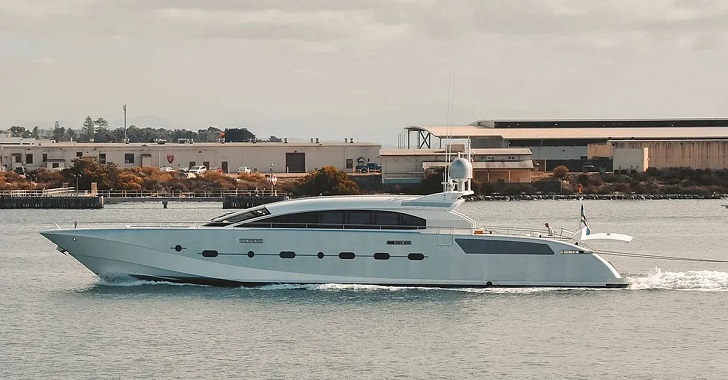
It has five levels, including a sundeck with a hot tub. Firefly is a smaller vessel in the fleet primarily used by Brin for watersports. It has two levels and a diving platform, and a jet ski.
The Fly Fleet Maintenance Team
To maintain the Fly Fleet, Sergey Brin has a 50-person maintenance team spread out around the world. The team is responsible for keeping the vessels in top condition and seaworthy.
Consistent maintenance is crucial for superyacht owners to keep the vessels in optimal condition. The Fly Fleet maintenance team follows a strict schedule of regular maintenance and inspections.
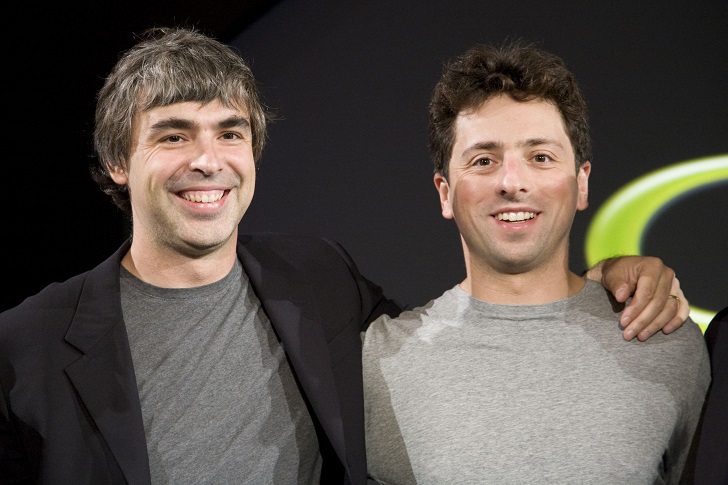
Downsizing to a Collection of Smaller Vessels
In contrast to Sergey Brin, Larry Page, the other co-founder of Google, took a different approach to superyachts. Page owned a 194-foot superyacht called Senses, which he sold in 2019. Instead of purchasing another superyacht, Page downsized to a collection of smaller vessels.
His new collection consists of a sailboat, a scientific research vessel, and a zero-emissions yacht. This decision allows Page more flexibility to explore different waters and reduces his carbon footprint.
The main reason for Larry Page’s downsizing decision is not clear. However, there are potential reasons why he may have chosen to do so. It could be to reduce costs, as a superyacht’s maintenance and running costs can be significant. It could also be to have more flexibility in where and how he explores the waters.
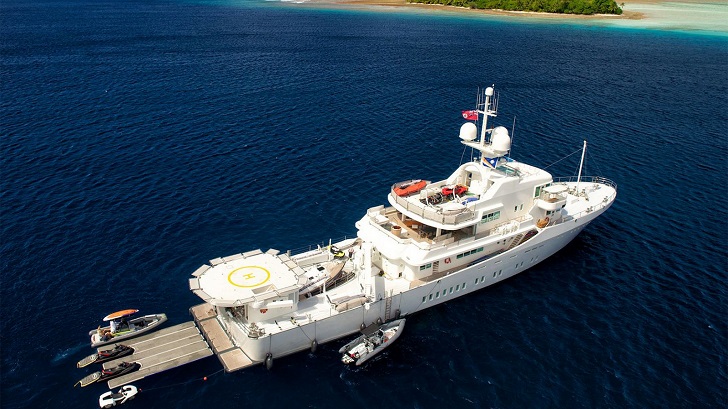
The Fly Fleet, owned by Sergey Brin and Larry Page’s downsizing approach to superyachts, showcases different approaches to luxury yacht ownership. The Fly Fleet is a collection of larger vessels maintained by a dedicated team, while Larry Page’s collection comprises smaller crafts.
Although there is no right or wrong approach, it is interesting to explore the different approaches of these two billionaires. The luxury yacht industry continues to evolve, and it will be exciting to see what new developments will arise.
Boat of the Year Award: Here Are the Winners!
The rise of branded luxury yachts, leave a reply cancel reply.
You must be logged in to post a comment.
The 10 Fastest Planes: Speed Demons of the Skies
Discover the world’s most expensive private jets, why jeff bezos’s yacht is making waves in the yachting world, discovering the best jet skis for your aquatic adventures.
- Starting a Business
- Growing a Business
- Small Business Guide
- Business News
- Science & Technology
- Money & Finance
- For Subscribers
- Write for Entrepreneur
- Tips White Papers
- Entrepreneur Store
- United States
- Asia Pacific
- Middle East
- South Africa
Copyright © 2024 Entrepreneur Media, LLC All rights reserved. Entrepreneur® and its related marks are registered trademarks of Entrepreneur Media LLC
The Luxury Boats Owned By Some of the Wealthiest People in Tech, from a Yacht So Big It Has Its Own Support Boat to Superyachts with Swimming Pools and Basketball Courts Tech billionaires like Jeff Bezos, Oracle cofounder Larry Ellison, and Google cofounders Sergey Brin and Larry Page have all purchased mini vacation hubs at sea.
By Grace Kay and Sindhu Sundar Jul 3, 2023
Key Takeaways
- Many billionaires like Jeff Bezos and Richard Branson enjoy spending their time on luxurious yachts.
- The boats are decked out with amenities that many Americans can only dream of.
- Here are some of the billionaires in tech who own private yachts.
This article originally appeared on Business Insider .
A regular Jane celebrating a personal renaissance after a long-term relationship might commemorate the new era with an ankle tattoo of a spiritual saying. When you're a billionaire, you could do it instead with a $500 million megayacht .
Amazon founder Jeff Bezos made waves in May riding around the roughly 127-meter "Koru," a Māori term that may signify a fresh start, with his reported fiancée Lauren Sanchez. (In 2019, Bezos finalized his divorce from MacKenzie Scott, whom he was married to for 25 years).
Beyond the private planes occupying the hangars of billionaires, yachts have come to symbolize the highly private sites of leisure and networking reserved for the ultra-wealthy .
Tech billionaires like Bezos, Oracle cofounder Larry Ellison, and Google cofounders Sergey Brin and Larry Page have all purchased their own mini vacation hubs at sea, decking their boats with amenities like gyms, spas, pools, nightclubs, and movie theaters.
For those wishing to experience life aboard these multi-million-dollar yachts, some are available to rent out for a few nights or weeks at a time. Late Microsoft cofounder Paul Allen's yacht can be booked for $2.2 million per week or more, according Bloomberg .
Chartering yachts owned by billionaires like Alphabet cofounder Sergey Brin has previously cost customers anywhere from $773,000 a week to $1.2 million .
It remains to be seen how these vessels will fare against the apparent Orca uprising.
Take a look at some of the yachts that have been owned by tech billionaires.
A mystery buyer bought a 414-foot superyacht that was once owned by late Microsoft co-founder Paul Allen for $278 million. Allen had the boat, which was named "Octopus," built in 2003 for $200 million. Since the tech billionaire's death in 2018, the boat had been listed for as much as $325 million.

Octopus in Canary Wharf, London, in 2012. Ki Price/Reuters Source: SuperYacht Times
The wealthy can book the yacht for a weekly rate of $2.2 million or more, through the luxury company Camper & Nicholsons, Bloomberg reported last year.
414ft luxury yacht 'Octopus' owned by Microsoft co-founder, Paul Allen, is moored to fuel up at Ege Ports in Kusadasi district of Aydin, Turkey on April 27, 2015. Ibrahim Uzun/Anadolu Agency/Getty Images
Sources: Bloomberg; Insider .
Amazon founder Bezos' $500 million megayacht, the roughly 127-meter "Koru," sparked attention in May for its artistic decor. A sculpture of a woman on the boat appeared to observers to be the likeness of Bezos' reported fiancée Sanchez, who was also seen that month on the yacht sporting a large ring.
Jeff Bezos was spotted aboard his megayacht "Koru" in May. Lift Aircraft.
Even before its completion, "Koru" drew the ire of Dutch people vowing to hurl eggs at the boat if it would require a historic bridge in Rotterdam to be taken apart to let it through. An egg crisis was averted however, as the company making the ship found a less-irksome alternative.
View of the Koningshaven Bridge, known as De Hef in Rotterdam, Netherlands. Peter Dejong/AP
Bezos has long been interested in yachts. In 2019, he was spotted aboard entertainment mogul David Geffen's superyacht.
David Geffen's superyacht Flickr via BI
Oracle cofounder Larry Ellison owns a 288-foot yacht named Musashi that he acquired in 2013. The yacht has several amenities, including an elevator, swimming pool, movie theater, and both an indoor and outdoor gym.
rulenumberone2/Flickr, Justin Sullivan/Getty Images
Source: Yacht Bible
Ellison has owned several superyachts over the years, including the Katana, the Ronin, and the Rising Sun.
Courtesy of Lurssen Source: Forbes .
The Oracle cofounder also has a knack for competitive yacht racing, and helped to found and back a racing team, called Oracle Team USA, in 2000. The team has found success and won several prestigious titles over the years.
Xaume Olleros/Getty Images Sport Source: Telegraph
Ellison previously owned a bigger, 454-foot yacht called Rising Sun, which was designed specifically for the CEO in 2005. That yacht reportedly has 82 rooms, a movie theater, a wine cellar, and a basketball court. However, Ellison sold off the Rising Sun to Geffen for a reported $300 million.
Kimberly White/Getty Images Source: Forbes , Boat International
Ellison's boat, Musashi, is a sister ship to the yacht of another billionaire, former Sears CEO Eddie Lampert. However, the yacht, named Fountainhead, is often mistaken for belonging to billionaire investor Mark Cuban. "The guy who owns the boat tells everyone that it's mine," Cuban told Page Six in 2016. "It's so crazy ... I don't even own a boat."
Mark Cuban. Steve Marcus/Reuters
Source: Page Six
Ellison's yacht reportedly influenced the decision of late Apple CEO Steve Jobs to get a boat himself. However, Jobs never set foot on the boat — the yacht was commissioned in 2008, but wasn't completed until 2012, a year after his death.
Justin Sullivan/Getty Images Source: Business Insider
When Jobs died in 2011, his yacht — along with his $14.1 billion fortune — was inherited by his wife, Laurene Powell Jobs, founder and president of a social-impact nonprofit called the Emerson Collective. The 256-foot yacht is named Venus, and is worth $130 million.
AP Photo/Peter Dejong Source: Business Insider
Google's billionaire cofounders, Larry Page and Sergey Brin, are known to splurge. An Insider feature in December documented some of the trappings of their luxury, including planes and yachts.
Sergey Brin (left) and Larry Page. Getty / Michael Nagle
Source: Insider .
Page owned a yacht named Senses, a $45 million, 194-foot boat that he bought in 2011 from a New Zealand businessman. He's since sold the yacht, Insider reported in 2021, a vessel that had a private beach club with a Jacuzzi and sun beds, both indoor and outdoor dining areas, and a helicopter pad. It's unclear what other sea vessels he owns, though Insider has previously reported he might have another yacht.
Ari Helminen/Flickr, Justin Sullivan/Getty Images Sources: Boat International; Insider .
Brin meanwhile owns a number of yachts and vessels including the 73-meter Dragonfly, and the 40-meter Butterfly, Insider reported in January.
Abell Point Marina/YouTube Source: Insider .
Dragonfly, the $80 million boat that has a movie-theater, shares a name with Google's once-secret project to launch a censored search engine in China. Google said in 2019 it had officially terminated the project.
Eric Risberg/Associated Press Source: Insider , Forbes .
The former Google CEO picked up the Alfa Nero yacht for nearly $68 million in an auction in June, according to a Bloomberg report. The yacht had apparently been left amid Russia's war in Ukraine, according to the report.
Eric Schmidt REUTERS/Brian Snyder Source: Bloomberg .
For Skype cofounder Niklas Zennstrom, his interest in yachts skews toward racing and competitive sailing. Zennstrom has gone through a succession of boats all named Ran.
Co-Founder and CEO of Skype Technologies, United Kingdom Niklas Zennstroem listens during a plenary entitled 'Digital 2.0:Powering a Creative Economy' at the World Economic Forum in Davos, Switzerland, AP Photo/Michel Euler
Source: CNN
The Ran VII yacht is among the most advanced of Zennstrom's boats. The racing yacht uses electrical power, which Zennstrom has said makes it "lighter, less drag, quieter, and most importantly it is environmentally friendly."
Carkeek Design Partners/YouTube Source: CNN
The 40-foot yacht has been meant to compete in regattas through the racing team owned by Zennstrom and his wife, Catherine. The Ran racing team launched in 2008, and has won some prestigious regattas.
The Ran racing team. Carkeek Design Partners/YouTube Source: CNN
Barry Diller, chairman of digital media company IAC, co-owns a $70 million yacht with his wife, fashion designer Diane von Furstenberg.
Diane von Furstenberg, left, and Barry Diller. Scott Olson/Getty Images Source: Business Insider
The sailing yacht, named Eos, is 350 feet long with six bedrooms. The power couple has hosted many celebrities over the years — a few that have been spotted aboard Eos include model Karlie Kloss, actor Bradley Cooper, journalist Anderson Cooper, and singer Harry Styles.
snowwahine/YouTube Source: W Magazine
For Jim Clark, the cofounder of Netscape, one yacht hasn't been enough. Clark has owned boats for more than 30 years, and in 2012, he put up two of his sailing yachts for sale.
Jim Clark, right. Cameron Spencer/Getty Images Source: Business Insider
Clark listed the boats for a combined $113 million: the 136-foot Hanuman for $18 million, and the 295-foot Athena for $95 million. However, Clark has yet to offload Athena. Clark also previously owned a 155-foot yacht named Hyperion, and currently also owns a sloop called Hanuman.
The yacht Athena. Fosnez / Wikimedia Commons Source: Boat International , Forbes
Charles Simonyi worked at Microsoft until 2002, and oversaw the creation of Microsoft Office software. A few years before he left, Simonyi decided to purchase a yacht. He told the designer that wanted his yacht to be "home away from [his] home in Seattle."
Reuters/Sergei Remezov Source: Boat International
The product of that conversation in 1999 is Simonyi's yacht named Skat, meaning "treasure" in Danish. The yacht measures 233 feet long, and is unique with its nontraditional design and gray color. Skat features a matching gray helicopter, a gym, and motorcycles.
Christopher Hunt/Getty Images Source: Yacht Charter Fleet
Opulent British billionaire Richard Branson owned a yacht until he sold it in September 2018. The 105-foot catamaran sold for $3 million, significantly lower than the $9.6 million price Branson listed the boat for in 2014.
Anthony Harvey/Getty Images, Virgin Source: Business Insider
Branson, the founder of Virgin Group, bought the boat in 2009. He named it Necker Belle, a nod to his private Caribbean island, Necker Island.
Necker Island Source: Business Insider
Additional reporting by Paige Leskin.
Want to be an Entrepreneur Leadership Network contributor? Apply now to join.
Editor's Pick Red Arrow
- Lock How to Design a Work Session That Tricks Your Brain Into Peak Performance, According to a Neuroscientist
- She Launched Her Black-Owned Beauty Brand with $1,500 in Her Pockets — Now Her Products Are on Sephora's Shelves
- No One Explained a 401(k) Until He Reached the NFL. So He Started Putting His Money to Work — and Helping Others Do the Same .
- Lock How to Land Your Next Job Without Sending a Single Resume
- Kevin O'Leary Says This Is the One Skill He Looks For in a Leader — But It's 'Almost Impossible to Find'
- Food Franchisees Are Shifting to Non-Food Investments — And You Should, Too
Most Popular Red Arrow
How to start a multi-million dollar company, according to an ibm engineer turned founder.
Leah Solivan took her company from idea to Ikea acquisition.
This Former Model Used Her Personal Savings to Start a Thrifty Side Hustle — Then Taylor Swift Became a Repeat Patron: 'People Really Responded'
Christy Dawn, founder of her namesake regenerative fashion brand, says she's always been on a mission "to create beauty in everything I do."
General Motors Announces Over 1,000 Job Cuts in Major Software Division Overhaul
Around 600 cut roles are from GM's technology campus in Warren, Michigan.
The Largest Franchise Operator in the U.S. Owns 2,800 Locations — And He Just Added 83 Wendy's to His Portfolio
Greg Flynn of The Flynn Group already operates restaurants under brands including Applebee's, Arby's, Taco Bell, Pizza Hut and Wendy's.
63 Small Business Ideas to Start in 2024
We put together a list of the best, most profitable small business ideas for entrepreneurs to pursue in 2024.
UK Tech Magnate Mike Lynch Missing After Yacht Sinks Off Italian Coast
One person has died and six people are missing, including four Americans, after the Bayesian superyacht sank off the coast of Sicily.
Successfully copied link
- Today's news
- Reviews and deals
- Climate change
- 2024 election
- Newsletters
- Fall allergies
- Health news
- Mental health
- Sexual health
- Family health
- So mini ways
- Unapologetically
- Buying guides
Entertainment
- How to Watch
- My watchlist
- Stock market
- Biden economy
- Personal finance
- Stocks: most active
- Stocks: gainers
- Stocks: losers
- Trending tickers
- World indices
- US Treasury bonds
- Top mutual funds
- Highest open interest
- Highest implied volatility
- Currency converter
- Basic materials
- Communication services
- Consumer cyclical
- Consumer defensive
- Financial services
- Industrials
- Real estate
- Mutual funds
- Credit cards
- Balance transfer cards
- Cash back cards
- Rewards cards
- Travel cards
- Online checking
- High-yield savings
- Money market
- Home equity loan
- Personal loans
- Student loans
- Options pit
- Fantasy football
- Pro Pick 'Em
- College Pick 'Em
- Fantasy baseball
- Fantasy hockey
- Fantasy basketball
- Download the app
- Daily fantasy
- Scores and schedules
- GameChannel
- World Baseball Classic
- Premier League
- CONCACAF League
- Champions League
- Motorsports
- Horse racing
New on Yahoo
- Privacy Dashboard
Google cofounder Sergey Brin's 'air yachts' have been approved for flight
Sergey Brin's airship company LTA Research recently received flight clearance for its vessel Pathfinder 1.
That means the company can now test the massive airship in designated airspaces in the Bay Area.
Brin launched the company in 2016 and plans to use his airships to deliver humanitarian aid.
Google cofounder Sergey Brin's airship is ready to take flight.
LTA Research, Brin's company that aims to deliver humanitarian aid through "lighter than air" blimp-like vehicles, announced this week that its Pathfinder 1 vessel received its airworthiness certificate. The company received the certificate on September 6, a spokesperson for the FAA subsequently told to Insider by email.
The Pathfinder 1, LTA's crown jewel, is a massive airship that's nearly 400 feet long and close to 66 feet wide at its broadest point. Airships are lighter than airplanes and typically don't require jet engines.
The airworthiness certificate allows the Pathfinder 1 to begin test flights at Moffett Field — a NASA airfield run by Google in the Bay Area — and Palo Alto airport's airspaces at heights of up to 1,500 feet. Eventually, it will move to the former Goodyear Airdock airship hangar in Akron, Ohio, where the company is already working on building an even larger vessel, the almost 600-foot Pathfinder 3, according to IEEE Spectrum.
When it does eventually take the skies, the Pathfinder 1 — propelled by 12 electric motors and the lift of 13 helium bags — will be used to deliver food and other basic necessities to remote areas of the world.
"We believe lighter than air technology has the capacity to speed up humanitarian aid by reaching remote locations with little infrastructure, and to lower carbon emissions for air and cargo transportation," LTA's CEO Alan Weston told the Financial Times in June 2022. Weston — an Australian aeronautics expert with a penchant for extreme sports — worked as a program director at NASA before he was tapped by Brin to helm LTA.
LTA's airships could one day carry up to 200 tons of cargo each — nearly ten times the amount a Boeing 737 can carry — Weston told Bloomberg in May. That, along with the fact that they don't require a runway or much infrastructure, is why the company hopes the vessels will play a key role in disaster relief.
"If runways, roads, and ports are damaged, LTA's airships can still deliver what communities need. If cellphone towers are knocked out, airships can hover and provide service," the company notes on its website .
The vehicle could also serve as a luxurious intercontinental "air yacht" for Brin's friends and family, as The Guardian once described it. Which means it might end up being an airborne addition to Brin's collection of luxury yachts and water-sports vehicles that those in his inner circle have dubbed "Fly Feet."
Over the years, Brin, who founded LTA Research in 2016, has been closely involved with the company, regularly visiting its facilities in the Bay Area to discuss progress and meet with Weston. It's not clear exactly how much Brin, who is worth $105 billion, per Bloomberg, has funneled into the venture, but factory floor workers said it could be more than $250 million, Bloomberg reported.
Read the original article on Business Insider
Recommended Stories
Zion williamson's apparent weight loss draws attention on social media.
New Orleans Pelicans star Zion Williamson appears to have lost notable weight during the offseason, based on photos taken at his basketball camp in South Carolina.
Falcons saw enough of Michael Penix Jr. last week that he won't play again this preseason
Michael Penix Jr. is done for the preseason, Raheem Morris said.
More middle-aged adults have been dying from strokes. Experts cite 3 factors that might be to blame.
A new report from the Centers for Disease Control and Prevention found that more American adults between the ages of 45 and 64 have been dying from strokes.
Bust alert! 13 players to avoid early in your drafts | Yahoo Fantasy Forecast
It's officially 'Convictions Week' on the pod as we provide our most definitive takes of draft season. Matt Harmon is joined by Yahoo Fantasy's resident hater Dan Titus to identify potential busts in each round of your draft. While both make it clear they don't think the guys they pick will have awful seasons, they do offer reasons why each of their picks won't meet the expectations of their current ADP. The two also end the show by answering your questions in the fantasy mailbag.
Mike Tyson shows no interest in taking Jake Paul's bait during news conference for Nov. 15 fight
Mike Tyson had little interest in trash-talking or insulting Jake Paul during the press conference for their Nov. 15 fight on Netflix.
Mortgage and refinance rates today, August 20, 2024: Experts predict rates will keep falling
These are today's mortgage and refinance rates. Almost all rates have dropped since the weekend, and rates should keep decreasing. Lock in your rate today.
Cubs release reliever Héctor Neris, avoid $9M vesting option for 2025
Neris was 14 appearances away from securing $9 million for next season with the Cubs.
Ford Mustang variants shown to dealers at a meeting full of potential products
Ford shows U.S. dealers some potential new products, including a four-door Mustang rendering, a hi-po 'Stang that's not a Shelby, and a Maverick-based van.
Outer Banks home falls into the ocean, highlighting a grim trend. See the photos.
Friday’s collapse marks the seventh home to be swept into the ocean in the last four years.
Apple event rumor roundup: What to expect at the iPhone 16 keynote
Apple event rumor roundup: What to expect at the Phone 16 keynote. Here's everything we know so far.
Digitally resurrecting actors is still a terrible idea
In the long-running "Alien" movie franchise, the Weyland-Yutani Corporation can’t seem to let go of a terrible idea: It keeps trying to make a profit from xenomorphs -- creatures with acid for blood and a penchant for violently bursting out of human hosts. Sadly, as much as I liked “Alien: Romulus” (and I liked it a lot!), the new sequel (or "interquel") can’t escape a terrible idea of its own: Hollywood’s fixation on using CGI to de-age or resurrect beloved actors. “Alien: Romulus” tries to pull off a similar trick — while it doesn't resurrect the exact same murderous android from the original “Alien,” it features an identical model, seemingly played by the same actor, Ian Holm, who died in 2020.
Steve Kerr reportedly won't continue as USA Basketball coach; Erik Spoelstra or Tyronn Lue expected to take over
Who will take over coaching Team USA for the Los Angeles Olympics?
Steelers, Raiders, Giants have QB issues while Cowboys need to choose CeeDee or Dak | McCoy & Van Noy
Three-time All-Pro Gerald McCoy and two-time Super Bowl champ Kyle Van Noy join forces for the premiere episode of their new podcast — where two legendary defensive players, one still in the game, and one who recently got out of it — chat about the ins and outs of life in the NFL.
These are the 10 longest-lasting vehicles on the road today
iSeeCars' latest analysis found that a handful of models have a much greater chance of lasting 250,000 miles than others.
Who's winning the 7 key swing states, Harris or Trump? Inside the latest polls.
A handy Yahoo News guide to the 2024 map.
Head coaches on the hot seat heading into 2024 | College Football Enquirer
Right before the 2024 season starts this Saturday, Dan Wetzel, Ross Dellenger and Pat Forde start the season on a positive note: by discussing which head coaches will get fired first. They inspect the hot seat situations for top names like Florida's Billy Napier, Baylor's Dave Aranda, and Arkansas' Sam Pittman.
Monterey Car Week: Unrestored Bugatti wins top honors; auction action hits speed bump; new luxe cars debut
Monterey Car Week in Pebble Beach ended yesterday with a bang.
Todd Bowles says Buccaneers won't miss absent Randy Gregory: 'Can't miss what you never had'
Tampa Bay Buccaneers Todd Bowles says the team won't miss linebacker Randy Gregory, who never reported to training camp amid his lawsuit against the NFL.
USA flag football QB on NFL players hoping to join the Olympic squad: 'They still have to go out there and compete'
With flag football making its Olympic debut in LA 2028, Team USA QB Darrell Doucette says NFL player won't be able to join the roster without a fight.
Researchers discover potentially catastrophic exploit present in AMD chips for decades
Researchers discovered a potentially catastrophic vulnerability in AMD chips that has been there for decades. It’s called a ‘Sinkclose’ flaw.

- CONFERENCES
- INDEPENDENT BROKER-DEALER SURVEY
- RIA SURVEY & RANKING
- 10 YOUNG ADVISORS TO WATCH
- KITCES AND BOWEN
- INVEST IN WOMEN
- CONTRASTING VIEWPOINTS
- THE BIG REVEAL

Inside A Billionaire's Family Office: Navy Seals, Yacht Captains
April 16, 2015 • Bloomberg News
Bayshore, based in Los Altos, California, provides a glimpse into the services family offices bestow upon the wealthy beyond investing and accounting. As the number of billionaires has surged worldwide in recent years, demand for people who can provide niche skills -- and discretion -- has jumped.
“Family offices are expanding and people are setting new ones up,” said Natasha Pearl, chief executive officer of Aston Pearl, which serves single-family offices that have at least $400 million. “It’s increasing demand for employees who can be trusted to keep the families’ private lives confidential.”
There are now more than 14,600 families with at least $100 million in assets globally, up 42 percent since 2008, according to the Boston Consulting Group. Many of these have set up their own offices to help manage investments and day-to-day lives. The firms employ about 20,000 people, according to London-based researcher Campden Wealth, which started collecting the data last year.
Vulcan, Microsoft
Family offices serving the world’s billionaires usually employ at least 50 people, with staff across multiple teams including executive, administrative and investment groups, according to Campden Wealth data.
Vulcan Inc., the Seattle-based company created by Microsoft Corp. co-founder Paul Allen and his sister Jody Allen, has more than 500 people. The family office features an in-house media company, a 17-member team managing a multi-billion dollar investment portfolio and a division that’s working on space travel. Vulcan is also currently hiring a chief investment officer and wildlife conversation expert among other positions, according to its website.
Allen, who has a net worth of $17 billion, according to the Bloomberg Billionaires Index, named Vulcan after the Roman god of fire. He’s also a Star Trek fan. Alexa Rudin, a spokeswoman for Vulcan, declined to comment.
Bayshore gets its name from the location of Google’s headquarters, an area in California known as North Bayshore. It’s existed since at least 2006, two years after Google, the world’s largest search engine, had its initial public offering.
You are not logged in
Please log back in before proceeding.
There was an error logging in. Please try again.
Congrats! You are now logged in. Your exam is being submitted.

The global authority in superyachting
- NEWSLETTERS
- Yachts Home
- The Superyacht Directory
- Yacht Reports
- Brokerage News
- The largest yachts in the world
- The Register
- Yacht Advice
- Yacht Design
- 12m to 24m yachts
- Monaco Yacht Show
- Builder Directory
- Designer Directory
- Interior Design Directory
- Naval Architect Directory
- Yachts for sale home
- Motor yachts
- Sailing yachts
- Explorer yachts
- Classic yachts
- Sale Broker Directory
- Charter Home
- Yachts for Charter
- Charter Destinations
- Charter Broker Directory
- Destinations Home
- Mediterranean
- South Pacific
- Rest of the World
- Boat Life Home
- Owners' Experiences
- Conservation and Philanthropy
- Interiors Suppliers
- Owners' Club
- Captains' Club
- BOAT Showcase
- Boat Presents
- Events Home
- World Superyacht Awards
- Superyacht Design Festival
- Design and Innovation Awards
- Young Designer of the Year Award
- Artistry and Craft Awards
- Explorer Yachts Summit
- Ocean Talks
- The Ocean Awards
- BOAT Connect
- Between the bays
- Golf Invitational
- BOATPro Home
- Superyacht Insight
- Global Order Book
- Premium Content
- Product Features
- Testimonials
- Pricing Plan
- Tenders & Equipment
The superyachts owned by tech moguls
Amazon founder Jeff Bezos is set to join the exclusive club of yacht-owning tech tycoons as the rumoured owner of Oceanco's mighty 127m sailing yacht . Though it should come as no surprise - other big names in tech such as the late Steve Jobs, Larry Ellison and Paul Allen have been responsible for some of the biggest and most ground-breaking superyachts in the world...
The 127-metre Oceanco sailing yacht Koru, formerly Y721, was launched and reportedly delivered to Amazon founder Jeff Bezos in April 2023. This three-masted schooner, meaning “new beginnings” in Maori, with an expected 33000 GT and a steel hull and aluminium superstructure, is the largest in the world and the longest built in the Netherlands at Oceanco. Knocking Lürssen's Eos , owned by Biller and Diane von Furstenburg, off the top spot, Koru harnesses design similarities with her black hull, white superstructure and classic lines. However, the intricate gold paintwork, scarlet bootstrap and elaborate figurehead on the bow particularly set her apart.
Larry Ellison
American business magnate Larry Ellison is the co-founder of the billion-dollar computer tech corporation Oracle. In 2004, he commissioned the 138-metre Lürssen superyacht Rising Sun (pictured), which stands today as the 15th largest yacht in the world. It was also the last yacht that ever came from the drawing boards of legendary designed Jon Bannenberg, sporting a military-esque profile with a lean destroyer-type hull and extensive use of structural glass . Rising Sun boasts 8,000m² of living space including a wine cellar and basketball court, with a crew of 45. One of her tenders, a catamaran, even carries the yacht’s 4x4 vehicle ashore.
Ellison later sold the yacht to media mogul David Geffen and has since hosted a parade of Hollywood's glitterati on board including Leonardo DiCaprio, Steven Spielberg, Bruce Springsteen and Oprah Winfrey – to name a few.
In 2011, Ellison appeared to downsize and took delivery of the 88-metre Feadship Musashi . Not unlike Rising Sun in its appearance, structural glass features heavily throughout with a central glass lift, surrounded by a stainless steel and glass staircase that passes through every deck.
More about this yacht
The late Microsoft co-founder Paul Allen is responsible for two of the most iconic superyachts in the world. At 126-metres in length, Octopus is perhaps his most famous. Built by Lürssen in 2003, this ice-classed superyacht was designed for extended cruising to the most remote locations on earth with a range of 12,500 nautical miles. Home to a helicopter garage, drive-in tender garage, six tenders, and a submarine, she packs a serious punch within her 9,932GT – not to mention the cinema, swimming pool, recording studio, basketball court and spa. At the end of 2019, she joined the market for the very first time , having completed an eight-month refit at Blohm+Voss, and remains the benchmark for exploration yachting.
Tatoosh is another honourable mention and was built by German shipyard Nobiskrug in 2000, three years prior to the delivery of Octopus . At 92-metres, she's smaller than her successor, but to describe Tatoosh as "small" would be a severe understatement. Highlights include a six-foot-deep swimming pool, a pair of helipads, a crew of 30, and a custom 12-metre Hinckley powerboat that she carries on her top deck. Tatoosh is also listed for sale following a refit earlier this year.
Yachts for charter
The 78-metre Feadship Venus was built for the late Apple boss and founder Steve Jobs. Built under the codename Project Aqua, Venus was launched to international fanfare in 2012, heralded for its extensive use of glass and pared-back design courtesy of Philippe Starck . Innovative features include a false top deck that conceals the communication and television receivers from view and a passarelle that, when opened, looks like the charging port of an iPhone. Venus ’s interior details have been closely guarded since its launch. Sadly, Jobs died a year before the yacht was delivered.
Charles Simonyi
Charles Simonyi led the team that built the first edition of the Microsoft Office software suite and was rumoured to have previously owned Lürssen’s iconic 71-metre SKAT . Nearly two decades after her launch in 2002, she joined the market for the first time and now Simonyi is thought to have upgraded to the 89-metre Lürssen Norn . Both yachts, penned by Espen Onion, share similar design features. Standout features include an alfresco cinema and adapted depth pool floor with dance floor. Norn was delivered in May 2023.
Sergey Brin
Google co-founder Sergey Brin reportedly owns the high-speed SilverYachts superyacht named Dragonfly , after Google’s once-secret project to launch a censored search engine in China. Delivered in 2009, the 73.3-metre Dragonfly was hailed as the fastest, most fuel-efficient long-range cruising superyacht on the water with a transatlantic range at 22 knots and a fuel consumption of only 360 litres per hour at 18 knots, extending her range to 4,500 nautical miles. Dragonfly is said to have a dance floor and open-air movie theatre on board. The vessel was applauded for its contribution to the disaster relief effort in Vanuatu after Hurricane Pam devastated the island in 2015. The crew reportedly moved 62 metric tons of freshwater ashore, treated over 250 patients, facilitated three medical evacuations, and built shelters in multiple villages and cleared numerous helicopter landing zones for ongoing support.
Yachts for sale
Google’s billionaire co-founder Larry Page purchased the 60-metre explorer yacht conversion Senses from a New Zealand businessman Sir Douglas Myers back in 2011. The globe-trotting superyacht features interiors by Philippe Starck and can accommodate a total of 12 guests on board, with primary guests reaping the benefits of the master suite's gyro-stabilised bed. Senses also houses an exceptional toy box with three high-speed tenders, six wave runners, a jet board and a JetLev. According to the New Zealand Herald, Senses is currently undergoing a refit in Whangārei, New Zealand, after being sold to an unknown buyer in 2020.
Barry Diller
The world’s largest three-masted schooner – also the third largest sailing yacht in the world – is owned by fashion designer Diane von Fürstenberg and her husband Barry Diller, chairman and senior executive of IAC/InterActiveCorp and Expedia Group. The 92.92-metre sailing yacht, named Eos , was built in Germany by Lürssen and delivered in 2006 with a trio of masts that stand 61-metres tall. The sailing yacht has hosted the couple's star-studded group of friends including Andy Cohen, Gayle King, Bradley Cooper, Harry Styles and Karlie Kloss. The interiors were designed by Francois Catroux, who Vanity Fair named as “the super-rich's favourite interior designer" in 2016.
Mark Zuckerburg
The 107-metre Kleven superyacht Andromeda was built for serial superyacht owner Graeme Hart and delivered under the name Ulysses . In 2017, a year after its launch, rumours began circulating that Facebook founder Mark Zuckerburg had purchased the rugged, six-deck explorer (although a Facebook spokesperson was quick to stamp out the rumours and released a statement denying the claims). Andromeda can carry 36 guests and is equipped with an impressive inventory of toys and tenders, including six motorbikes, two ATVs, a helicopter and an amphibious rib. Five years after her launch, Andromeda still ranks among the largest explorer yachts in the world .

Eric Schmidt
The former Google ceo Eric Schmidt backed out of the purchase of the abandoned 81.3-metre Oceanco Alfa Nero but has been said to have moved onto become the new owner of a 95-metre Lürssen. Kismet was sold in September 2023 to the billionaire as part of one of the biggest brokerage deal of the year. With the details shrouded in secrecy the yacht is now aptly known as Whisper . Espen Onio was responsible for her iconic exterior while inside was thanks to Reymond Langton , achieving the original brief from the previous commissioning owner Shahid Khan of “caviar and champagne.” Standout details include the hi-tech, art deco saloon, a private observation platform and the Persian-inspired spa area.
The co-founder and former ceo of WhatsApp, Jan Koum, has been rumoured to own the 99.9-metre Feadship , Moonrise. The yacht’s clean and strong lines, penned by Chris Bottoms from Studio de Voogt , won the highly competitive class of best displacement motor yachts above 3,000 GT in the World Superyacht Awards 2021. Features include the helicopter landing deck and modern interiors by Remi Tessier . Accommodation is for up to 16 guests, and there are 32 crew members onboard Moonrise to attend to the guests' every need. The Ukrainian-American mogul is also said to own the accompanying support vessel Nebula.
Evan Speigel
The Silicone Valley ceo, Snapchat founder Evan Spiegel has been reportedly said to own the 94.8-metre Feadship Bliss. Delivered in 2021 the motor yacht penned by Feadship's Studio De Voogt Naval Architects has most recently been spotted cruising Auckland in September 2023. Spiegel is rumoured to be Feadship's younger client. Bliss can accommodate up to 18 guests across nine staterooms; however little else is known about the 2983 GT yacht.
Sponsored listings
- INSIDER REVIEWS
- TECH BUYING GUIDES
The crazy, eccentric, successful life of Google cofounder Sergey Brin
But brin comes from humble beginnings. he was born to parents michael and eugenia brin in the soviet union during the summer of 1973..

At the time, his father Michael dreamed of being an astrophysicist, but anti-Semitism in Soviet Russia coupled with his Jewish background kept him from those ambitions and even made it hard for him to find work as a mathematician — he ended up working as an economist for a government planning agency, crunching numbers for Soviet propaganda. The family managed to get exit visas and flee the USSR when Sergey was six, but his family's stressful, troubled experience left the Google cofounder with a lasting appreciation for democracy and freedom.
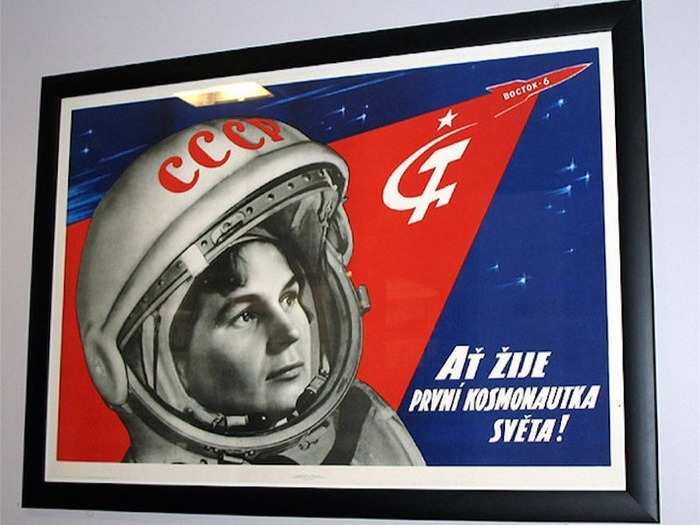
Source: In The Plex
Brin first re-visited Moscow when he was 17 on a class trip led by his father. "Thank you for taking us all out of Russia," he told Michael Brin solemnly. Spurred by a blossoming defiant streak, he threw pebbles at a police car, almost getting in serious trouble when the officers inside noticed.
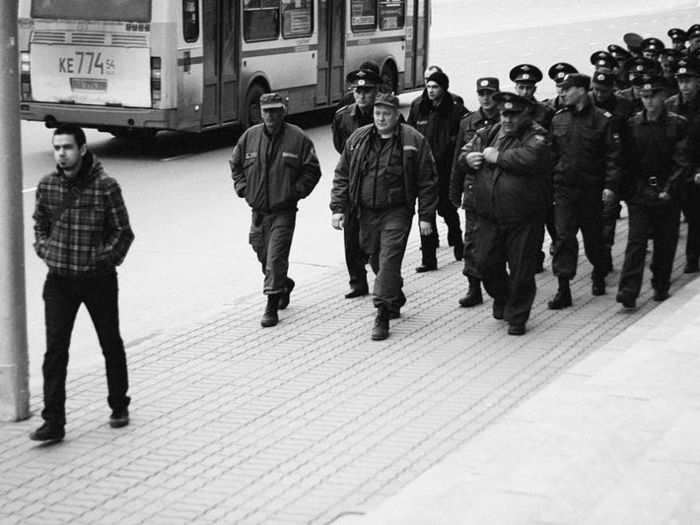
Source: Moment Mag
Eventually, Brin earned his bachelor's in mathematics and computer science at the University of Maryland, and then flew west to Stanford to get his PhD. There, his love of high-adrenaline exercise flourished, as he tried out skating, skiing, gymnastics, and even trapeze.
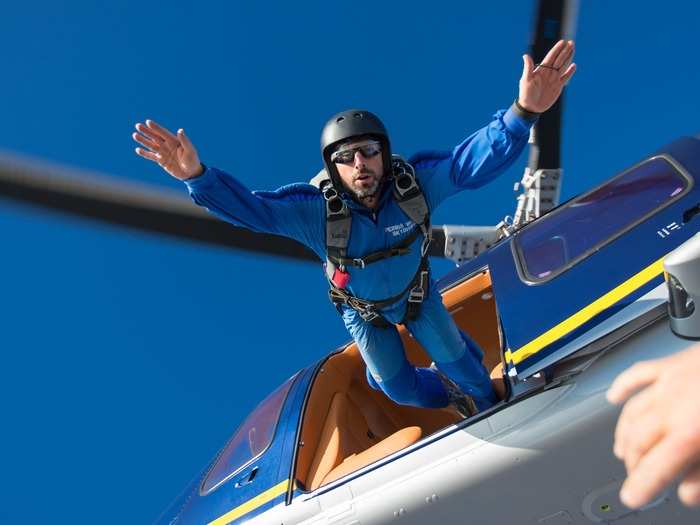
Source: Founders of Google and Moment Mag
Brin met Larry Page at Stanford in 1995. The two became close friends, geeking out about computer science. They started collaborating on a search engine they initially called BackRub.
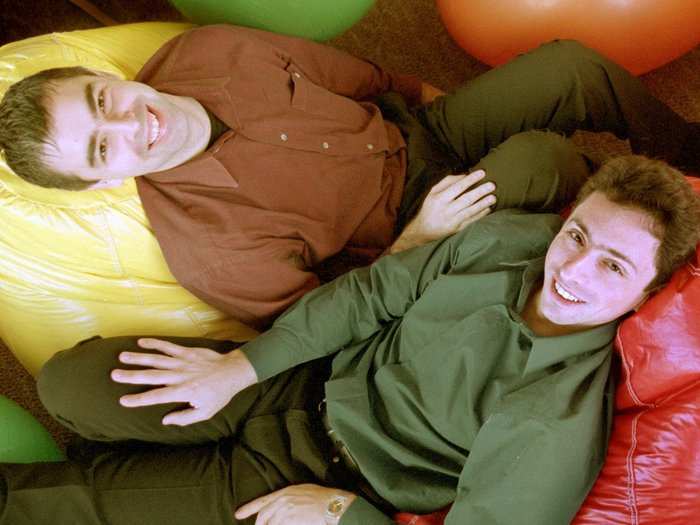
They registered the domain Google.com in September 1997 with the mission to organize the world's information. The rest is history.

Both Brin and Page are "burners," meaning they're devout fans of Burning Man, the free-wheeling art festival in the middle of the Nevada desert. They created the first Google Doodle ever in 1998 to let people know they weren't around to do damage control if the site broke. They eventually only approved the hire of former CEO Eric Schmidt after they heard he loved Burning Man, too.

Brin also has a wild sense of humor, according to early Google employee Douglas Edwards. "He conducted job interviews once dressed as a cow," Edwards told Fast Company. As an April Fools' joke, he once told pregnant Google employees that he would be offering birthing classes.

Source: Fast Company
As Google ballooned from simply a search engine to a huge company with dozens of diverse projects, Brin has been the mastermind for some of the most ambitious ones, including self-driving cars, smart contact lenses, and Google Glass.
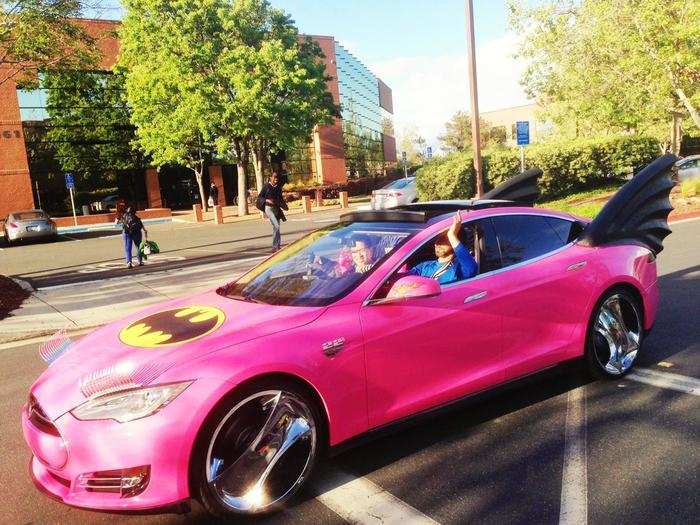
Source: The New Yorker
For a long time, you couldn't spot Brin *without* the computerized glasses. The New York Times reports that Brin may have played a big role in the product's rocky launch, rushing it into the world before it was ready for public scrutiny.
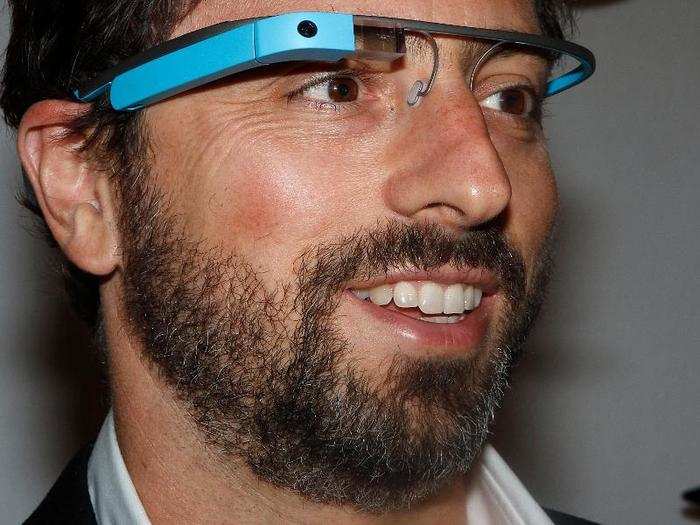
Source: The New York Times
Meanwhile, Brin married Anne Wojcicki — CEO of genetics company 23andMe and sister of early Google employee Susan Wojcicki — in 2007.
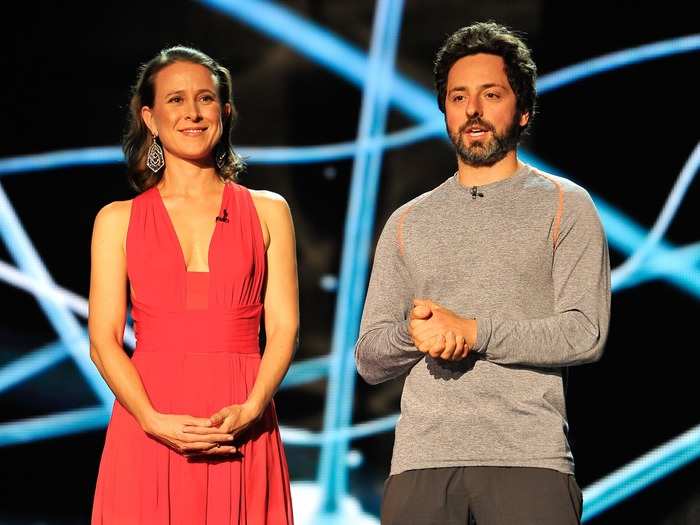
Over the years, the techie couple has donated hundreds of millions of dollars to charity, including at least $160 million to Parkinson's research. It's a cause that's particularly important for Brin. The neurodegenerative disease runs in his family — both his great aunt and mother had it — and a test through 23andMe revealed that Brin has a genetic mutation that makes him predisposed.
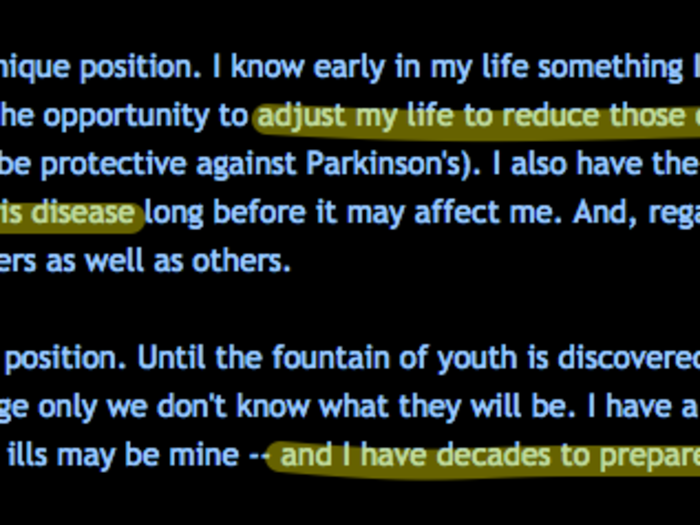
Source: Inside Philanthropy
To lower his chances of getting Parkinson's, Brin started exercising even more intensely and drinking green tea twice a day. Thanks to his health regimen and scientific progress, he estimated in 2010 that he now has only a ~10% chance of getting the disease.
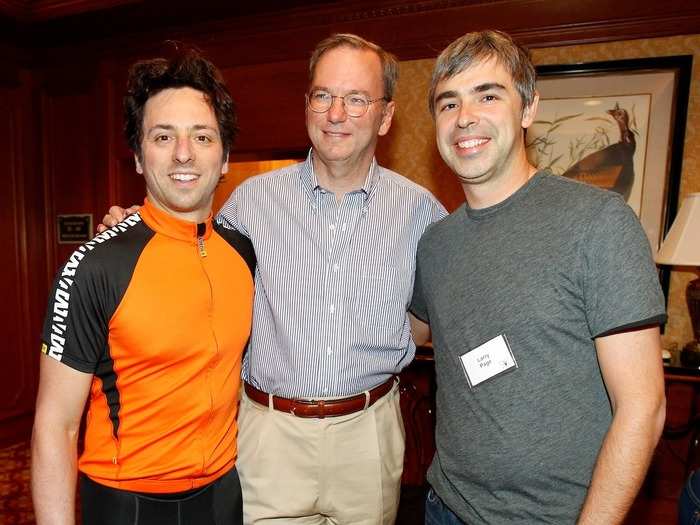
Source: Wired
But not all of Brin's lavish wealth goes to charitable causes. As of 2011, he, Page, and Schmidt had collectively purchased eight private jets. He owns real estate in New York City's hip West Village and Los Altos in California.

Source: The Mercury News and Zillow
He has actually invested quite a bit of money in Los Altos, principally through a real estate investment firm called Passerelle Investment Co., which has helped mom-and-pop, kid-friendly stores and cafes spring up or stay in business.
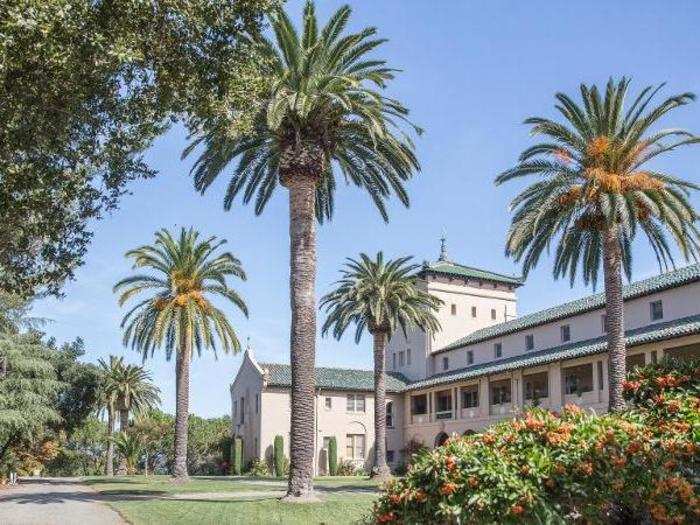
Source: Wall Street Journal
Brin also employs at least 47 people to manage his personal affairs— including a yacht captain, personal shopper, and a former Navy SEAL — through a company called Bayshore Global Management.
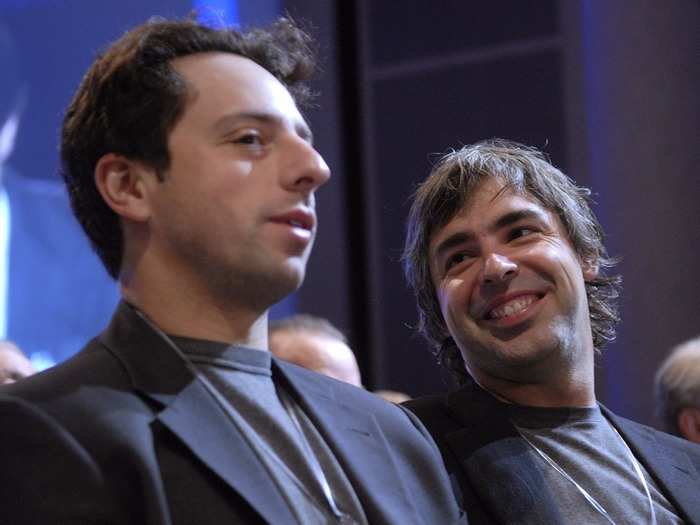
Source: Bloomberg and New Zealand Herald
Brin hasn't had the kind of smooth-sailing in his love-life as he did in starting a career though. Unfortunately, his marriage to Wojcicki hit the rocks when Brin allegedly had an affair with a fellow Google employee in 2013. The couple officially finalized a divorce in June 2015, after eight years of marriage.
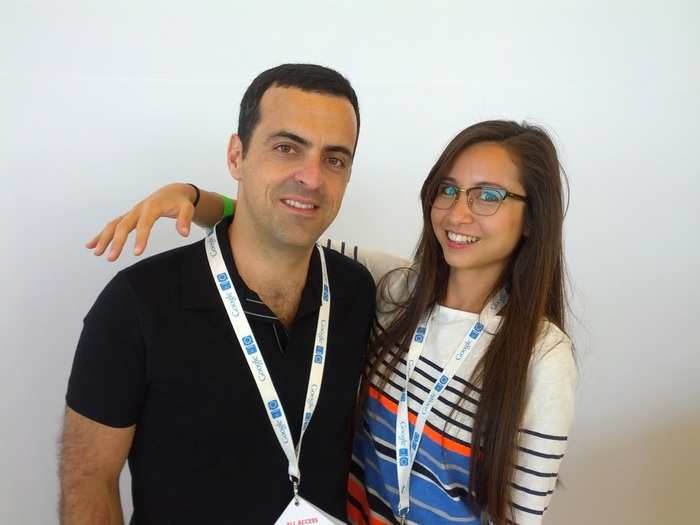
Source: Vanity Fair and Business Insider
"Obviously everyone wants to be successful, but I want to be looked back on as being very innovative, very trusted and ethical," Brin has said. "And ultimately making a big difference in the world."
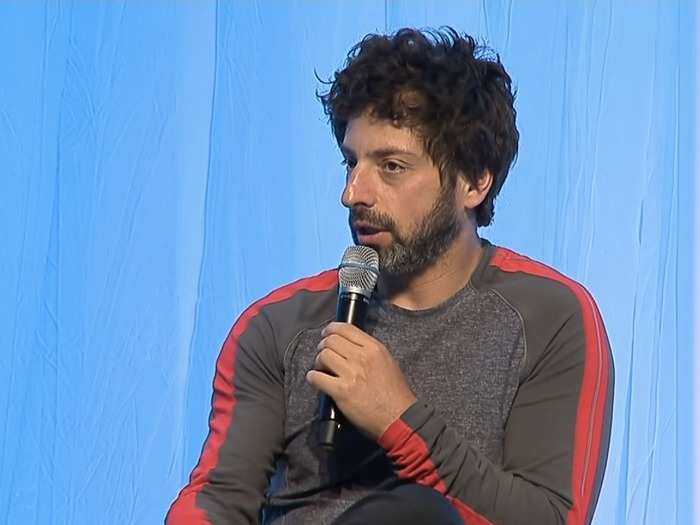
Source: Vanity Fair and ABC News
(Here he is "hanging out" with whistle-blower Edward Snowden at a 2014 TED conference.)
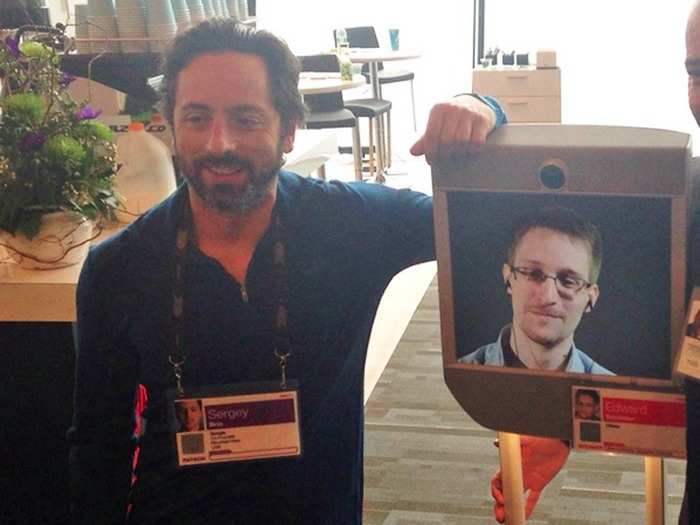
Source: TechCrunch
Those who have known him attest to the fact that he truly does believe in using knowledge and power for the greater good. The Economist once called him the Enlightenment Man for his dedication to using reason and science to solve huge world problems.
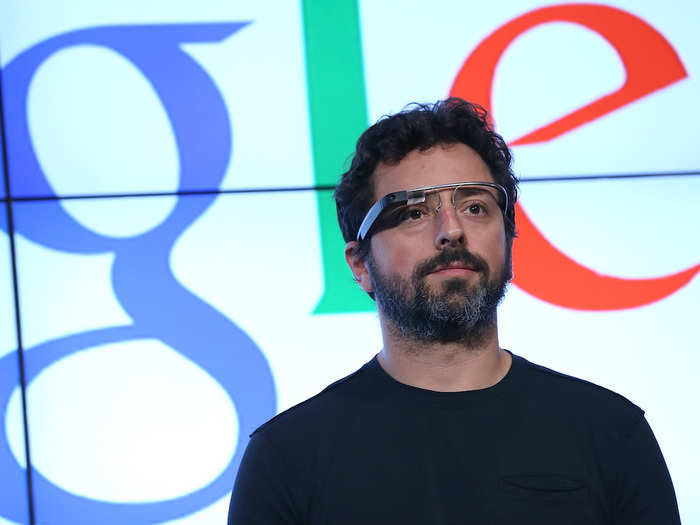
Source: The Economist
Brin admitted on stage at the 2014 Code Conference that he should never have worked on the company's now-dismantled social network Google+ because he's not very social and, actually, "kind of a weirdo."
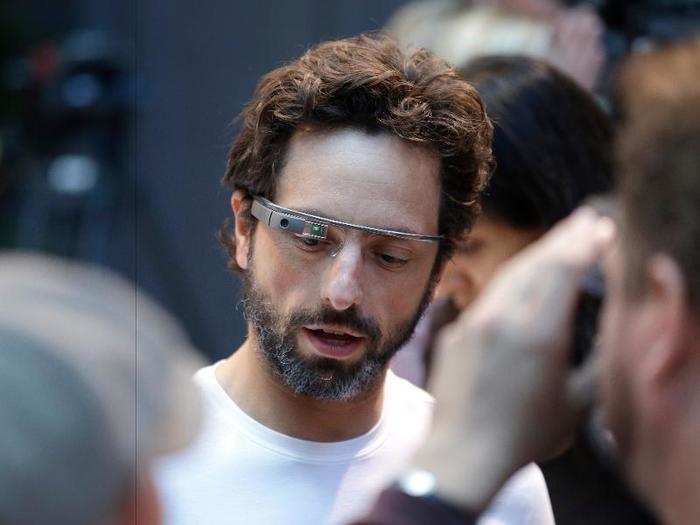
Source: Business Insider
But, certainly a rich one, at any rate. After Google delivered a bang-up Q1 earnings report in 2015, the stock had its largest one-day rally ever at the time, and both Brin and Page added about $4 billion to their fortunes.
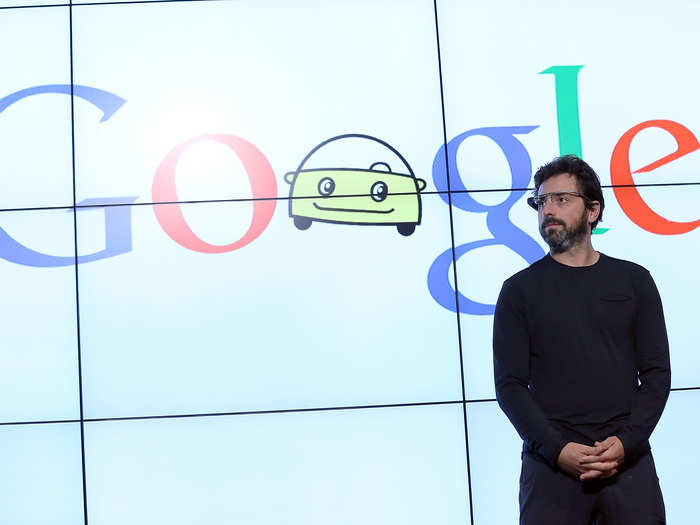
Now that he's president of Alphabet, he'll likely keep spouting innovative ideas to help steer the company. "We are still trying to do things other people think are crazy but we are super excited about," Page wrote about he and Brin's mission in the Alphabet announcement.
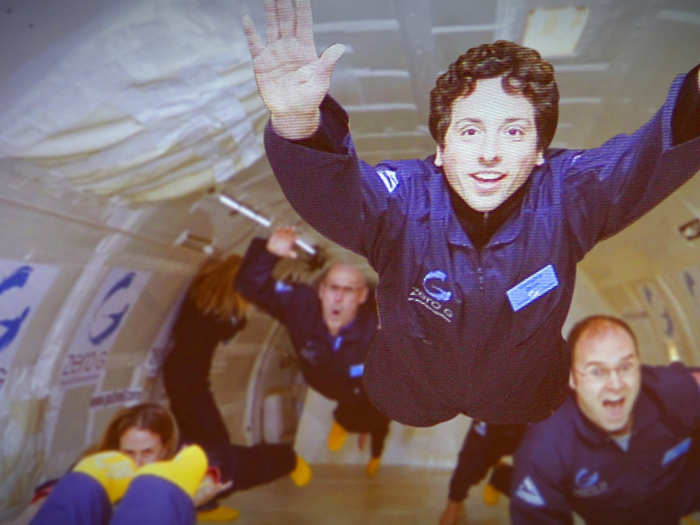
READ MORE ARTICLES ON
- Sergey Brin
Popular Right Now
Advertisement

Yacht Brinkmanship: Owners of Tech’s Biggest Pleasure Craft Compete to the Ends of the Earth
For some, a superyacht isn’t enough—you also need submersibles, remotely operated vehicles, a starlink or two, and a support vessel with a landing pad and extra crew..
If you’re Sergey Brin, Evan Spiegel, Jan Koum, Jeff Bezos, Laurene Powell Jobs, Eric Schmidt, Yuri Milner or any one of dozens of other modern-day tech moguls, it’s not enough to just own a yacht. Now you might need two—one for you and your guests to ride on, and one to act as a “support vessel,” tailing you around the seven seas while towing submersibles, seaplanes, helicopters or just some extra deckhands.
It’s the maritime version of keeping up with the Joneses. When it comes to accumulating pleasure craft, tech’s billionaire elite are sparing no expense—and that includes on submarines, the newest must-have add-on to the luxury superyacht, Titanic disasters be damned. Executives seem to bring the same cutthroat ambition to yachting that they do to business, sizing up each other’s yacht lengths, hiring the same small cadre of designers and tradespeople, and filling them with the same toys and tech.
“If you’re a billionaire, you want to have the nicest things because you can,” said superyacht designer Jonathan Quinn Barnett. “I think it’s actually a pleasure to know that if there’s anything out there, you own the finest.”
The insanely successful life of Google cofounder Sergey Brin
Google just pressed the reset button, completely overhauling its corporate structure through the formation of a brand new parent company called Alphabet.
This change comes nearly 20 years after cofounders Larry Page and Sergey Brin first launched Google from a dorm room in Stanford.
It's been a wild ride for both of them since, but Brin's history is especially intriguing.
Learn more about the man behind the world's most popular search engine:
With the announcement of Alphabet, Brin got a title upgrade, transitioning from overseeing the moonshot factory Google X as "director of special projects" to being president of the new parent company.
All told, Brin is worth about $34.3 billion, according to Forbes.
Source: Forbes
But Brin comes from humble beginnings. He was born to parents Michael and Eugenia Brin in the Soviet Union during the summer of 1973.
At the time, his father Michael dreamed of being an astrophysicist, but anti-Semitism in Soviet Russia coupled with his Jewish background kept him from those ambitions and even made it hard for him to find work as a mathematician — he ended up working as an economist for a government planning agency, crunching numbers for Soviet propaganda. The family managed to get exit visas and flee the USSR when Sergey was six, but his family's stressful, troubled experience left the Google cofounder with a lasting appreciation for democracy and freedom.
Source: In The Plex
(Here he is "hanging out" with whistle-blower Edward Snowden at a 2014 TED conference.)
Source: TechCrunch
The Brins ended up in Maryland, and Sergey's parents enrolled him in a Montessori school that emphasized independence and fostering creativity (Google cofounder Larry Page also went to a Montessori school, as did Amazon founder and CEO Jeff Bezos).
Brin first re-visted moscow when he was 17 on a class trip led by his father. "thank you for taking us all out of russia," he told michael brin solemnly. spurred by a blossoming defiant streak, he threw pebbles at a police car, almost getting in serious trouble when the officers inside noticed..
Source: Moment Mag
Eventually, Brin earned his bachelor's in mathematics and computer science at the University of Maryland, and then flew west to Stanford to get his PhD. There, his love of high-adrenaline exercise flourished, as he tried out skating, skiing, gymnastics, and even trapeze.
Source: Founders of Google and Moment Mag
At Stanford, Brin met Larry Page in 1995. The two became close friends, geeking out about computer science. They started collaborating on a search engine they initially called BackRub.
They registered the domain Google.com in September 1997 with the mission to organize the world's information. The rest is history.
Both Brin and Page are "burners," meaning they're devout fans of Burning Man, the free-wheeling art festival in the middle of the Nevada desert. They created the first Google Doodle ever in 1998 to let people know they weren't around to do damage control if the site broke. They eventually only approved the hire of former CEO Eric Schmidt after they heard he loved Burning Man, too.
Even as the two cofounders started building what would become a multi-billion dollar company, Brin has remained loud-and-proud about his fitness obsession, counting workout clothes and Vibram barefoot shoes as his typical wardrobe and frequently zipping around on rollerblades, doing yoga stretches during meetings, or walking around on his hands for fun.
Source: Business Insider
Brin also has a wild sense of humor according to early Google employee Douglas Edwards. "He conducted job interviews once dressed as a cow," Edwards told Fast Company. As an April Fools' joke, he once told pregnant Google employees that he would be offering birthing classes.
Source: Fast Company
As Google ballooned from simply a search engine to a huge company with dozens of diverse projects, Brin has been the mastermind for some of the most ambitious, including self-driving cars, smart contact lenses, and Google Glass.
Source: The New Yorker
For a long time, you couldn't spot Brin *without* the computerized glasses. The New York Times reports that Brin may have played a big role in the product's rocky launch, rushing it into the world before it was ready for public scrutiny.
Source: The New York Times
Meanwhile, Brin married Anne Wojcicki — CEO of genetics company 23andMe and sister of early Google employee Susan Wojcicki — in 2007.
Their wedding entailed inviting guests to a secret location in the Bahamas and they both wore bathing suits for the ceremony, which took place on a sandbar. They have two children together.
Source: Vanity Fair
Over the years, the techie couple has donated hundreds of millions of dollars to charity, including at least $160 million to Parkinson's research. It's a cause that's particularly important for Brin. The neurodegenerative disease runs in his family — both his great aunt and mother had it — and a test through 23andMe revealed that Brin has a genetic mutation that makes him predisposed.
Source: Inside Philanthropy
To lower his chances of getting Parkinson's, Brin started exercising even more intensely and drinking green tea twice a day. Thanks to his health regime and scientific progress, he estimated in 2010 that he now has only a ~10% chance of getting the disease.
Source: Wired
But not all of Brin's lavish wealth goes to charitable causes. As of 2011, he, Page, and Schmidt had collectively purchased eight private jets. He owns real estate in New York City's hip West Village and Los Altos in California.
Source: The Mercury News and Zillow
He has actually invested quite a bit of money in Los Altos, principally through a real estate investment firm called Passerelle Investment Co which has helped mom-and-pop, kid-friendly stores and cafes spring up or stay in business.
Source: Wall Street Journal
Brin also employs at least 47 people to manage his personal affairs— including a yacht captain, personal shopper, and a former Navy SEAL — through a company called Bayshore Global Management.
Source: Bloomberg and New Zealand Herald
Brin hasn't had the kind of smooth-sailing in his love-life as he did in starting a career though. Unfortunately, he and Wojicki's marriage hit the rocks when Brin allegedly had an affair with a fellow Google employee in 2013. The couple officially finalized a divorce in June 2015, after eight years of marriage.
Source: Vanity Fair and Business Insider
"Obviously everyone wants to be successful, but I want to be looked back on as being very innovative, very trusted and ethical," Brin has said. "And ultimately making a big difference in the world."
Source: Vanity Fair and ABC News
Those who have known him attest to the fact that he truly does believe in using knowledge and power for the greater good. The Economist once called him the Enlightenment Man for his dedication to using reason and science to solve huge world problems.
Source: The Economist
Brin admitted on stage at the 2014 Code Conference that he should never have worked on the company's now-dismantled social network Google+ because he's not very social and, actually, "kind of a weirdo."
But, certainly a rich one, at any rate. After Google delivered a bang-up Q1 earnings report, the stock had its largest one-day rally ever, and both Brin and Page added about $4 billion to their fortunes.
Now that he's president of Alphabet, he'll likely keep spouting innovative ideas to help steer the company. "We are still trying to do things other people think are crazy but we are super excited about," Page wrote about he and Brin's mission in the Alphabet announcement.
- Main content
- WEATHER ALERT Flood Warning Full Story
- ABC7 New York 24/7 Eyewitness News Stream Watch Now
- LIVE | Copter Cam Watch Now
- THE LOOP | NYC Weather and Traffic Cams Watch Now
- LIVE: ABC News coverage of 2024 DNC Watch Now
Drone attack launched on Moscow: Officials

In what is one of the largest drone attacks since the Russia-Ukraine war began, Moscow officials said they shot down at least 12 drones on Wendesday.
The Air Defense Forces of the Ministry of Defense shot down 10 UAVs Tuesday night and two more Wednesday morning, local time, according to Moscow Mayor Sergey Sobyanin.
It was not clear how many drones and missiles were launched in total.
This is a developing story. Please check back for updates.
Related Topics
Top stories.

Police investigating body parts found in Brooklyn Bridge Park

'Yes, she can': Obama endorses Harris, blasts Trump at DNC Day 2

New policy could force migrant families out of shelters
- 12 minutes ago

Jennifer Lopez files for divorce from Ben Affleck

AccuWeather: Fall feel continues
Ukraine launches drone attack on Moscow: officials
6 cars set on fire in the Bronx after alleged arson spree
Pro-Palestinian, anti-DNC protesters confront police in Chicago
- Digital Magazine
- Moment Minute
- The Antisemitism Project
- Israel-Hamas War
- Jewish Political Voices Project

- Ask the Rabbis
- Big Questions
- Jewish Word
- Literary Moment
- Moment Debate
- Moment Memoir
- Talk of the Table
- The Wisdom Project
- Time Travel with Moment
- Visual Moment
- Antisemitism
- Arts & Culture
- Jewish World
- Moment Video
- Jewish Politics & Power
- U. S. Politics
- Back Issues
- Current Issue
- Moment Magazine Guides
- MOMENTLIVE! Zoominars
- Podcasting Network
- MOMENTLIVE! classes
- Black-Jewish Relations
- Focus on Israel
- Insights into Antisemitism
- Israel Virtual Book Series
- Middle East
- WNET’s Exploring Hate
- About Moment
- Supporting Moment
- Bookstore Partners
- Work With Us
- Frequently Asked Questions
- Cartoon Caption Contest
- Moment Magazine-Karma Foundation Short Fiction Contest
- The Daniel Pearl Investigative Journalism Initiative
- MomentBooks
The Story of Sergey Brin
- October 10, 2021
It takes a bit of searching to find Sergey Brin’s office at the Googleplex. Tucked away in a corner of Building #43 on this sprawling campus near the southern tip of San Francisco Bay, past rows of colorfully decorated cubicles and dorm-like meeting spaces, Office 211 has a nondescript exterior and sits far from the public eye. Although it takes several twists and turns to get there, his office is not protected—as you would expect for the cofounder of a $150-billion company—by a Russian nesting doll’s worth of doors and gatekeepers.
Sergey, 33, shares the space with his Google cofounder, fellow Stanford Ph.D. dropout and billionaire pal, 34-year-old Larry Page, an arrangement that began eight years ago in the company’s first humble headquarters in a Menlo Park, California, garage. Since then, Google has grown from just another Silicon Valley startup into the world’s largest media corporation; in fact, based on its recent stock price of $513 per share, Google, which has made searching the Web easy and even fun, is larger than Disney, General Motors and McDonald’s combined. It achieved these lofty heights by revolutionizing how people surf the Internet: Before Sergey and Larry analyzed the links between web pages to deliver search results speedily based on relevance, looking up information on the Web was a shot in the dark.
Stepping through the sliding glass door into their office is like walking into a playroom for tech-savvy adults. A row of sleek flat-screen monitors lining one wall displays critical information: email, calendars, documents and, naturally, the Google search engine. Assorted green plants and an air purifier keep the oxygen flowing, while medicine balls provide appropriately kinetic seating. Upstairs, a private mezzanine with Astroturf carpeting and an electric massage chair afford Sergey and Larry a comfortable perch from which to entertain visitors and survey the carnival of innovation going on below. And there is ample space for walking around, which is absolutely essential for Sergey, who just can’t seem to sit still.
Trim and boyishly handsome, with low sloping shoulders that give him a perpetually relaxed appearance, Sergey bounces around the Googleplex with apparently endless energy. He has dark hair, penetrating eyes and a puckish sense of humor that often catches people off guard. A typical workday finds him in jeans, sneakers and a fitted black T-shirt, though his casual manner belies a serious, even aggressive sense of purpose. This intensity emerges during weekly strategy meetings, where Sergey and Larry—who share the title of president—command the last word on approving new products, reviewing new hires and funding long-term research. Sergey also holds sway over the unscientific but all-important realms of people, policy and politics. Google’s workers enjoy such family-friendly perks as three free meals a day, free home food delivery for new parents, designated private spaces for nursing mothers, and full on-site medical care, all of which recently led Fortune magazine to rank the company as the #1 place to work in the country.
The co-presidents share management duties with Eric Schmidt, a seasoned software executive whom they hired as chief executive officer in 2001 to oversee the day-to-day aspects of Google’s business—in short, to be the “adult” in the playroom. But they have no intention of ceding control. Since day one, they have resisted outside meddling, preferring to do everything their own way, from opting to piece together computers on the cheap (and build a computer casing out of Lego blocks) to flouting Wall Street in an unconventional initial public offering. Blazing one’s own trail comes naturally to Sergey. The Moscow-born entrepreneur and his parents have been doing it their entire lives.
On December 16, 2005, 16 months after the company’s high-flying initial stock auction, Google closed its biggest deal yet: a $1-billion advertising partnership with America Online, the popular Internet service provider.
That evening, by coincidence, I am meeting with Sergey’s parents at their home in the suburbs of Washington, DC. Michael Brin, wearing a black fleece vest emblazoned with the multicolored Google logo, greets me in the driveway. I ask if he has heard the big news. “We spoke with Sergey earlier today and he didn’t mention anything,” he tells me. “He did say he was on his way home from yoga.”
Michael, 59, a mathematics professor at the University of Maryland, and his wife, Eugenia, 58, a research scientist at NASA’s Goddard Space Flight Center, are gracious and down-to-earth and still somewhat astonished by their son’s success. “It’s mind-boggling,” marvels Genia, as family and friends call her. She speaks slowly, in a syrupy, Russian-accented English that quickens when she is competing with her husband. “It’s hard to comprehend, really. He was a very capable child in math and computers, but we could have never imagined this.” Michael, in his milder accent, adds with typical pragmatism, “Google has saved more time for more people than anything else in the world.”
They sit me down at the dining room table, clearing off papers to make space for a spread of cheese and fruit. The room itself is simply decorated, even sparse; the only signs of wealth I can see anywhere are a big-screen TV in the living room and a Lexus in the driveway.
The Brins are a compact, young-looking couple; Michael is skeptical in demeanor with a precise manner of speaking, and Genia soft and nurturing. Both have sincere, easygoing laughs. We talk for several hours, interrupted occasionally by Michael’s cigarette breaks, for which he heads outside with the family dog, Toby. Smoking is a habit he brought with him from the Soviet Union in 1979, when he immigrated to the United States with his mother, Maya, Genia and Sergey, then six. (A second son, Sam, was born in 1987.)
One of Michael’s stories particularly strikes me. In the summer of 1990, a few weeks before Sergey’s 17th birthday, Michael led a group of gifted high school math students on a two-week exchange program to the Soviet Union. He decided to bring the family along, despite uneasiness about the welcome they could expect from Communist authorities. It would give them a chance to visit family members still living in Moscow, including Sergey’s paternal grandfather, like Michael, a Ph.D. mathematician.
It didn’t take long for Sergey, a precocious teenager about to enter college, to size up his former environs. The Soviet empire was crumbling and, in the drab, cinder-block landscape and people’s stony mien of resignation, he could see first-hand the bleak future that would have been his. On the second day of the trip, while the group toured a sanitarium in the countryside near Moscow, Sergey took his father aside, looked him in the eye and said, “Thank you for taking us all out of Russia.”
“There were only two occasions when my children were grateful to me,” Michael says dryly, and I get the sense that he is completely serious. The other occasion, he says, involved Sergey’s younger brother, Sam, and the repair of a broken toilet.
Genia, seated next to him, protests. “Misha, what are you talking about!?” she exclaims, as she often does when their memories differ or when she feels Michael is editorializing.
As Sergey recalls, the trip awakened his childhood fear of authority. His crisp tenor voice, tinged with a faint accent that is no longer identifiably Russian, came to me via satellite phone as he flew to Asia last November. Teenagers have their own way of transforming fear into defiance, Sergey reflects, remembering that his impulse on confronting Soviet oppression had been to throw pebbles at a police car. The two officers sitting inside got out of the car “quite upset” he says but, luckily, his parents were able to defuse the matter.
“My rebelliousness, I think, came out of being born in Moscow,” Sergey says, adding, “I’d say this is something that followed me into adulthood.”
At a bagel shop across the street from the Maryland campus where he has taught dynamical systems and statistics for 25 years, Michael talks of the discrimination that drove him to take his family out of Russia. It’s a bitter cold day in College Park, reminiscent of winter in Moscow. Over a lunch of soup and sandwiches, Michael explains how he was forced to abandon his dream of becoming an astronomer even before he reached college. Officially, anti-Semitism didn’t exist in the U.S.S.R. but, in reality, Communist Party heads barred Jews from upper professional ranks by denying them entry to universities. Jews were excluded from the physics department, in particular, at the prestigious Moscow State University, because Soviet leaders did not trust them with nuclear rocket research. Unfortunately for Michael, astronomy fell under the rubric of physics.
Michael opted to study mathematics instead. But gaining acceptance to the math department at Moscow State, home of arguably the brightest mathematicians in the world, also proved exceedingly difficult. Discrimination there was administered by means of entrance exams for which Jews were tested in different rooms from other applicants—morbidly nicknamed “gas chambers”—and graded more harshly. Nevertheless, with help from a well-connected family friend, Michael was accepted and in 1970 graduated with an honors degree.
“I had all A’s except for three classes where I got B’s: history of the Communist Party, military training and statistics,” he says. “But nobody would even consider me for graduate school because I was Jewish. That was normal.” So Michael became an economist for GOSPLAN, the central planning agency. “I was trying to prove that, in a few years, living standards in Russia would be higher than in the United States,” he says. “And I proved it. I know enough about math to prove whatever you want.”
He continued to study mathematics on his own, sneaking into evening seminars at the university and writing research papers. After several were published, Brin began a doctoral thesis. At the time, a student in the Soviet Union could earn a doctorate without going to graduate school if he passed certain exams and an institution agreed to consider his thesis. Michael found two advisers, an official adviser, an ethnic Russian, and an informal Jewish mentor. (“Jews could not have Jewish advisers,” he says.) With their help, he successfully defended his thesis at a university in Kharkov, Ukraine, but life didn’t change much even after he received his Ph.D. He continued in his day job at GOSPLAN and received a 100-ruble raise. “I thought I was rich. Life was beautiful,” he says with a wry chuckle.
For Genia, life in Moscow was also comfortable enough. She, too, had managed to overcome the entrance hurdles to attend Moscow State, graduating from the School of Mechanics and Mathematics. In a research lab of the Soviet Oil and Gas Institute, a prestigious industrial school, she worked alongside a number of other Jews. “I was content in my job and had many friends,” she says. The Brins’ encounters with institutional anti-Semitism did not extend to day-to-day interactions with colleagues and neighbors. Highly assimilated into Russian culture, they were part of the intelligentsia and had a circle of university-educated friends. Occupying a tiny, three-room apartment in central Moscow, 350 square feet in all shared with Michael’s mother, they were better off than many Muscovites who still lived in communal apartments. After Sergey was born, on August 21, 1973, the courtyard of their hulking five-story building became his playground. In keeping with Russian tradition, Sergey spent two hours in the morning and evening each day outdoors, regardless of the season.
As we talk at the bagel shop, Michael keeps careful watch on the time. Every so often he leaps from his chair and dashes outside. This isn’t just for a smoke, although he does light up. He’s also keeping close tabs on the parking meters, his and mine, and takes care when the time runs out to drop in more quarters.
The history of Russian Jewish emigration in the mid-1970s can be neatly summarized in a joke from the era: Two Jews are talking in the street, a third walks by and says to them, “I don’t know what you’re talking about but yes, it’s time to get out of here!”
“I’ve known for a long time that my father wasn’t able to pursue the career he wanted,” Sergey tells me. As a young boy, though, Sergey had only a vague awareness of why his family wanted to leave their native Russia. He picked up the ugly details of the anti-Semitism they faced bit by bit years later, he says. Nevertheless, he sensed, early on, all of the things that he wasn’t: He wasn’t Russian. He wasn’t welcome in his own country. He wasn’t going to get a fair shake in advancing through its schools. Further complicating his understanding of his Jewish identity was the fact that, under the ardently atheist Soviet regime, there were few religious or cultural models of what being Jewish was. The negatives were all he had.
Sergey is too young to remember the day, in the summer of 1977, when his father came home and announced that it was time for the family to emigrate. “We cannot stay here any more,” he told his wife and mother. He had arrived at his decision while attending a mathematics conference in Warsaw. For the first time, he had been able to mingle freely with colleagues from the United States, France, England and Germany. Discovering that his intellectual brethren in the West “were not monsters,” he listened as they described the opportunities and comforts of life beyond the Iron Curtain. “He said he wouldn’t stay, now that he had seen what life could be about,” says Genia.
The couple knew, of course, the perils of applying for an exit visa. They could easily end up refuseniks, unable to find work, shunned, in perpetual limbo. Nobody had promised Michael a position abroad but he was confident he could find work in the West that was intellectually stimulating and would support the family. Genia, however, was unconvinced. They had lived in Moscow their entire lives. They had decent jobs and a young son. Was it worth it to try to leave? “I didn’t want to go,” she says. “It took a while for me and his mother to agree. I had a lot more attachments.” It was up to Michael to do the convincing. “I was the only one in the family who decided it was really important to leave—not in some distant future,” he says.
The Brins’ story provides me with a clue to the origins of Sergey’s entrepreneurial instincts. His parents, academics through and through, deny any role in forming their son’s considerable business acumen—“He did not learn it from us, absolutely not our area,” Michael says. Yet Sergey’s willingness to take risks, his sense of whom to trust and ask for help, his vision to see something better and the conviction to go after it—these traits are evident in much of what Michael Brin did in circumventing the system and working twice as hard as others to earn his doctorate, then leave the Soviet Union.
For Genia, the decision ultimately came down to Sergey. While her husband admits he was thinking as much about his own future as his son’s, for her, “it was 80/20 about Sergey.” They formally applied for an exit visa in September 1978. Michael was promptly fired. Genia, who had obtained her job through a relative, had to quit to insulate him from any recrimination. “When he got a whiff of our intentions,” she says, “he said ‘please get out of there as soon as possible.’ It had to be a secret from everybody at work, my real reason for leaving. So I lied to all of my coworkers that I was simply leaving my job because I got another job, where I would only have to be at work three days a week and the salary would be higher. I made up—totally made up—the name of a place where I was planning to work.” There was no other job, of course, and suddenly they found themselves with no income. To get by, Michael translated technical books into English, but it was painstaking work. He also began to teach himself computer programming, having no expectation of getting an academic position if they ever got out. When Genia found temporary work, again lying about her situation, they shared responsibility for looking after Sergey, who stayed at home rather than attend a miserable Soviet pre-school. And then they waited.
For many Soviet Jews , exit visas never came. But, in May 1979, the Brins were granted papers to leave the U.S.S.R. “We hoped it would happen,” Genia says, “but we were completely surprised by how quickly it did.” The timing was fortuitous: They were among the last Jews allowed to leave until the Gorbachev era.
Sergey, who turned six that summer, remembers what followed as simply “unsettling”—literally so. “We were in different places from day to day,” he says. The journey was a blur. First Vienna, where the family was met by representatives of HIAS, the Hebrew Immigrant Aid Society, which helped thousands of Eastern European Jews establish new lives in the free world. Then, on to the suburbs of Paris, where Michael’s “unofficial” Jewish Ph.D. advisor, Anatole Katok, had arranged a temporary research position for him at the Institut des Hautes Etudes Scientifiques. Katok, who had emigrated the year before with his family, looked after the Brins and paved the way for Michael to teach at Maryland.
When the family finally landed in America on October 25, they were met at New York’s Kennedy Airport by friends from Moscow. Sergey’s first memory of the United States was of sitting in the backseat of the car, amazed at all the giant automobiles on the highway as their hosts drove them home to Long Island.
The Brins found a house to rent in Maryland—a simple, cinder-block structure in a lower-middle-class neighborhood not far from the university campus. With a $2,000 loan from the Jewish community, they bought a 1973 Ford Maverick. And, at Katok’s suggestion, they enrolled Sergey in Paint Branch Montessori School in Adelphi, Maryland.
He struggled to adjust. Bright-eyed and bashful, with only a rudimentary knowledge of English, Sergey spoke with a heavy accent when he started school. “It was a difficult year for him, the first year,” recalls Genia. “We were constantly discussing the fact we had been told that children are like sponges, that they immediately grasp the language and have no problem, and that wasn’t the case.”
Patty Barshay, the school’s director, became a friend and mentor to Sergey and his parents. She invited them to a party at her house that first December (“a bunch of Jewish people with nothing to do on Christmas Day”) and wound up teaching Genia how to drive. Everywhere they turned, there was so much to take in. “I remember them inviting me over for dinner one day,” Barshay says, “and I asked Genia, ‘What kind of meat is this?’ She had no idea. They had never seen so much meat” as American supermarkets offer.
When I ask about her former pupil, Barshay lights up, obviously proud of Sergey’s achievements. “Sergey wasn’t a particularly outgoing child,” she says, “but he always had the self-confidence to pursue what he had his mind set on.”
He gravitated toward puzzles, maps and math games that taught multiplication. “I really enjoyed the Montessori method,” he tells me. “I could grow at my own pace.” He adds that the Montessori environment—which gives students the freedom to choose activities that suit their interests—helped foster his creativity.
“He was interested in everything,” Barshay says, but adds, “I never thought he was any brighter than anyone else.”
One thing the Brins shared with thousands of other families emigrating to the West from the Soviet Union was the discovery that, suddenly, they were free to be Jews.
“Russian Jews lacked the vocabulary to even articulate what they were feeling,” says Lenny Gusel, the founder of a San Francisco-based network of Russian-Jewish immigrants; many newcomers he encounters struggle with this fundamental change. “They were considered Jews back home. Here they were considered Russians. Many longed just to assimilate as Americans.” Gusel’s group, which he calls the “79ers,” after the peak year of immigration in the 1970s, and its New York cousin, RJeneration, have attracted hundreds of 20- and 30-something immigrants who grapple with their Jewish identity. “Sergey is the absolute emblem of our group, the number one Russian-Jewish immigrant success story,” he says.
The Brins were no different from their fellow immigrants in that being Jewish was an ethnic, not a religious experience. “We felt our Jewishness in different ways, not by keeping kosher or going to synagogue. It is genetic,” explains Michael. “We were not very religious. My wife doesn’t eat on Yom Kippur; I do.” Genia interjects: “We always have a Passover dinner. We have a seder. I have the recipe for gefilte fish from my grandmother.”
Religious or not, on arriving in the suburbs of Washington, the Brins were adopted by a synagogue, Mishkan Torah of Greenbelt, Maryland, which helped them acquire furnishings for their home. “We didn’t need that much, but we saw how much the community helped other families,” Genia says.
Sergey attended Hebrew school at Mishkan Torah for the better part of three years but hated the language instruction and everything else, too. “He was teased there by other kids and he begged us not to send him any more,” his mother remembers. “Eventually, it worked.” The Conservative congregation turned out to be too religious for the Brins and they drifted. When a three-week trip to Israel awakened 11-year-old Sergey’s interest in all things Jewish, the family inquired at another synagogue about restarting studies to prepare for a bar mitzvah. But the rabbi said it would take more than a year to catch up and Sergey, who didn’t want to wait past his 13th birthday, abandoned the pursuit.
If there was one Jewish value the Brin family upheld without reservation, Michael says, it was scholarship. Sergey’s brother—who in his younger years was more fond of basketball than homework—even got the notion that advanced degrees were mandatory for all professions. “Sam once asked us, ‘Is it true that before you play in the N.B.A. you have to get a Ph.D.?’” recalls his dad. To which the professor couldn’t resist replying, “Yes, Sam, that’s it!”
Sergey attended Eleanor Roosevelt High School, a large public school in Greenbelt. He raced through in three years, amassing a year’s worth of college credits that would enable him to finish college in three years as well. At the University of Maryland, he majored in mathematics and computer science and graduated near the top of his class. When he won a prestigious National Science Foundation scholarship for graduate school, he insisted on Stanford. (M.I.T. had rejected him.) Aside from the physical beauty of Stanford’s campus, Sergey knew the school’s reputation for supporting high-tech entrepreneurs. At the time, though, his focus was squarely on getting his doctorate.
Personable, with an easy smile , Sergey brims with a healthy self-assuredness that at times spills over into arrogance. At Stanford, he was known for his habit of bursting in on professors without knocking. One of his advisers, Rajeev Motwani, recalls, “He was the brash young man. But he was so smart, it just oozed out of him.” His abiding interest was computer science, specifically the field of “data mining,” or how to extract meaningful patterns from mountains of information. But he also took time out to enjoy Stanford social life and all manner of sports: skiing, rollerblading, gymnastics, even trapeze. His father once remarked, “I asked him if he was taking any advanced courses, and he said, ‘yes, advanced swimming.’”
What came next is Google legend. In the spring of 1995, during a prospective student weekend, Sergey met an opinionated computer science student from the University of Michigan named Larry Page. They talked and argued over the course of two days, each finding the other cocky and obnoxious. They also formed an instant connection, relishing the intellectual combat.
Like Sergey, Larry is the son of high-powered intellects steeped in computer science. His father, Carl Victor Page, a computer science professor at Michigan State University until his death in 1996, received one of the first Ph.D.s awarded in the field. His mother, Gloria, holds a master’s degree in computer science and has taught college programming classes. The two young graduate students also shared a Jewish background. Larry’s maternal grandfather made aliyah and lived in the desert town of Arad near the Dead Sea, working as a tool and die maker, and his mother was raised Jewish. Larry, however, brought up in the mold of his father, whose religion was technology, does not readily identify as a Jew. He, too, never had a bar mitzvah.
Larry and Sergey soon began working on ways to harness information on the World Wide Web, spending so much time together that they took on a joint identity, “LarryandSergey.” By 1996, Larry had hit on the idea of using the links between web pages to rank their relative importance. Borrowing from academia the concept of citations in research papers as a measure of topicality and value, he and Brin applied that thinking to the Web: if one page linked to another, it was in effect “citing” or casting a vote for that page. The more votes a page had, the more valuable it was. The concept seems rather obvious in retrospect, and today most search engines operate on this principle. But, at the time, it was groundbreaking. Calling their new invention Google—a misspelling of a very large number in mathematics—Larry and Sergey shopped it around to various companies for the price of $1 million.
No one was interested. In the technology boom of the late 1990s, conventional thinking was that so-called web portals like Yahoo! and AOL, which offered email, news, weather and more, would make the most money. No one cared about search. But Sergey and Larry knew they were on to something, so they decided to take leaves of absence from Stanford and build a company themselves. Sergey’s parents were skeptical. “We were definitely upset,” Genia says. “We thought everybody in their right mind ought to get a Ph.D.”
Soliciting funds from faculty members, family and friends, Sergey and Larry scraped together enough to buy some servers and rent that famous garage in Menlo Park. Their venture quickly bore fruit: After viewing a quick demo, Sun Microsystems cofounder Andy Bechtolsheim (himself a Jewish immigrant from Germany) wrote a $100,000 check to “Google, Inc.” The only problem was, “Google, Inc.” did not yet exist—the company hadn’t yet been incorporated. For two weeks, as they handled the paperwork, the young men had nowhere to deposit the money.
It is difficult to pinpoint the moment when Google became a true American phenomenon. Traditional measures, such as gracing the cover of Time magazine or being profiled on 60 Minutes , seem irrelevant when it comes to the fast-moving world of the Internet. But there’s no doubt about the date that Wall Street began to take the quirky California company seriously. It was April 29, 2004, when Google formally filed paperwork for its initial public offering of stock.
Two things shocked the investment world that day. First were the company’s staggeringly large revenue and profit figures, which until then had been closely guarded secrets. No one had dreamed that the subtle text advertisements Google placed alongside search results—which many web users don’t even recognize as ads—could be so profitable. Second was the ruthlessly earnest “founders’ letter” that Sergey and Larry had included with the filing, which began by stating that Google was “not a conventional company” and did not intend to become one. They followed up that show of bravado by granting an interview to Playboy for publication during a mandatory “quiet period” before the public offering, when securities regulations restrict company executives’ public comments. The misdeed prompted many to wonder whether the Google founders were careless and immature or just incorrigible troublemakers. It didn’t help that they had decided to make it tough for Wall Street insiders to dominate the stock offering by selling shares via public auction—their way of making the process more democratic and transparent.
On August 16, 2004, its first day of trading, Google stock shot from $85 to $100 per share. Last November, it crossed the $500 mark, a number seldom seen in stock market history and far above the share prices of rivals Microsoft and Yahoo! At that price, Sergey and Larry, who together hold a controlling interest the company, each boast an estimated net worth of $15 billion.
What does that sort of money do to a 33-year-old? If you’re Sergey, you buy a new house on the peninsula south of San Francisco, trade in your hybrid Toyota Prius for a fancier ride, and continue shopping at Costco. “From my parents, I certainly learned to be frugal and to be happy without very many things,” Sergey tells me. “It’s interesting—I still find myself not wanting to leave anything on the plate uneaten. I still look at prices. I try to force myself to do this less, not to be so frugal. But I was raised being happy with not so much.” His parents say Sergey taught them to shop at Costco, too. “He bought us a membership,” Michael says. “It’s a store that he knows and understands.”
Sergey also understands something about cooking, a skill he picked up on his own. “A month before leaving [for Stanford], he realized he didn’t know how to cook, so he learned,” his mother tells me. Now, he owns a pasta machine and often joins his father in the kitchen when he comes home to visit. His specialty is Chernobyl Chili—“45 minutes in the microwave.”
The trappings of extreme wealth haven’t passed Sergey by entirely. In 2005, he and Larry jointly purchased a Boeing 767 jet and had it refitted for personal use. Interior sketches of the “party airplane”—which has two staterooms, sitting and dining areas, a large galley and seating for 50—surfaced in The Wall Street Journal last July. At one point, according to the plane’s designer, the Google founders got into a spat over Sergey’s insistence on a “California” king-sized bed in his private cabin. CEO Schmidt had to mediate, telling them, “Sergey, you can have whatever bed you want in your room; Larry, you can have whatever bed you want in your bedroom. Let’s move on.”
While everyone I’ve talked to who knows them well repeats the same line—“They’re good guys”—gossip web sites occasionally print rumors of Larry and Sergey’s soirees in posh private clubs and other typical jet-setter antics. They are without a doubt two of the most eligible bachelors on Google Earth, but both are reported to be in serious relationships: Larry with Stanford graduate student Lucy Southworth, and Sergey with Anne Wojcicki, a healthcare investor and the sister of Google executive Susan Wojcicki, who owned the garage where Google got started. In a 2001 interview for the now-defunct web site Women.com, Genia said she hoped Sergey would find “somebody exciting who could be really interesting to him….[who] had a sense of humor that could match his.” As one might expect, she also prefers that Sergey marry a Jewish girl. “I hope that he would keep it in mind,” she confided.
The Ten Commandments it’s not, but Google does operate with a moral code of sorts: “Don’t Be Evil.” The maxim is supposed to guide behavior at all levels of the company. When pressed for clarification, Eric Schmidt has famously said, “Evil is whatever Sergey says is evil.”
One malevolent practice, in Google’s view, is tampering with or otherwise censoring the list of results produced by a Google search. An early test of the Google founders’ commitment to providing unfiltered information struck very close to home. The anti-Semitic web site “Jew Watch” appeared prominently in Google results for searches on the term “Jew,” prompting some Jewish groups to demand that Google remove the defamatory site from the top of its listings. Google refused. Sergey said at the time, “I certainly am very offended by the site, but the objectivity of our rankings is one of our very important principles.” As a compromise, Google displays a warning at the top of questionable pages entitled “Offensive Search Results,” which links to a fuller explanation of Google’s policy: “Our search results are generated completely objectively and are independent of the beliefs and preferences of those who work at Google.”
The most telling measure of Google’s moral code has come in China, the world’s second largest Internet market, where an army of Communist Party bureaucrats actively monitors and censors the Internet. During months of intense debate at the Googleplex, Sergey, Larry and other executives weighed the vast profit potential of launching a China-based service against their opposition to the country’s odious human rights abuses. Ever the computer geeks, Schmidt said they actually worked up an “evil scale.” To their minds, operating a censored Google site in China was a lesser evil than providing spotty, substandard service from outside the country. The outcome also happened to favor the profit motive. Viewed against the backdrop of Sergey’s distaste for authority, the decision to cave in to China’s totalitarian leadership seems out of character.
Sergey’s public comments on the matter have evolved to reflect this contradiction. While firmly defending the decision at first, he later acknowledged that Google had “compromised” its principles. “Perhaps now the principled approach makes more sense,” he allowed in June, but added, “It’s not where we chose to go right now.”
How Google deals with such thorny matters as accommodating government requests for information is not merely of passing interest. As the world’s dominant search engine, used some 300 million times daily, it marshals an immense amount of data about our collective interests, needs and desires. And that’s not all. Because every search typed into Google is stored indefinitely and can often be traced to individual computer users, privacy advocates point out that clever government prosecutors or divorce lawyers could get their hands on our personal digital dossiers. Google’s motto may be “Don’t Be Evil,” but it all depends into whose hands this information falls.
Does any company founded by two Jews, no matter how assimilated, necessarily retain some defining Jewish characteristics? The Google masterminds’ penchant for pushing boundaries—without asking permission—might as well be called chutzpah. However you label it, it’s an attitude that runs deeply through Google and may help explain why the company is embroiled in lawsuits over many of its new projects: the aggressive scanning of library books it doesn’t own; display of copyrighted material; and copyright issues connected to its acquisition of YouTube, the online video site whose popularity rests in part on the availability of pirated television and movie clips.
Google’s first employee and a number of other early hires were Jewish and, when the initial winter holiday season rolled around, a menorah rather than a Christmas tree graced the lobby. (The next year, there was a tree wrapped in Hanukkah lights.) Google’s former chef, Charlie Ayers, cooked up latkes, brisket, tzimmes and matzah ball soup for Hanukkah meals and turned the Passover seder into a Google tradition. To some, Google’s emphasis on academic achievement—hiring only the best and the brightest and employing hundreds of Ph.D.s—could be considered Jewish. So, perhaps, could “Don’t Be Evil.” With its hint of tikkun olam , the Kabbalistic concept of “repairing the world” is evident in the company’s commitment to aggressive philanthropy. Sergey and Larry have pledged $1 billion of Google’s profits to the company’s philanthropic arm, known as Google.org, which will funnel money both to nonprofit charities and companies that deal with global poverty, environmental issues and renewable energy.
Personal philanthropy is one area where Sergey intends to proceed cautiously. “I take the philosophical view that, aside from some modest stuff now, I am waiting to do the bulk of my philanthropy later, maybe in a few years, when I feel I’m more educated,” he says. “I don’t think it’s something I have had time to become an expert at.” Nevertheless, he and his parents do support a few charities. “There are people who helped me and my family out. I do feel responsible to those organizations,” he says. One of them is HIAS, the immigrant aid group that helped the Brins come to the United States. Genia serves on its board and heads its project to create a digital record of Jewish immigrant archives.
Sergey’s own Jewish sensibility is grounded in his family’s experience. “I do somewhat feel like a minority,” he says. “Being Jewish, especially in Russia, is one aspect of that. Then, being an immigrant in the U.S. And then, since I was significantly ahead in math in school, being the youngest one in a class. I never felt like a part of the majority. So I think that is part of the Jewish heritage in a way.” Today, of course, being a young billionaire, he’s again in a class by himself. “I don’t feel comfortable being one of the crowd,” he reflects. “It’s kind of interesting—I really liked the schools that I went to, but I never rooted for the sports teams. I was never one of the crowd supporting something or not. I like to maintain my independence.”
I’m curious as to whether Sergey has been a target of anti-Semitism since he left the Soviet Union. “I’ve experienced it,” he tells me. “Usually it is fairly subtle. People harp on all media companies being run by Jewish executives, with the implication of a conspiracy.” As an example, he cites the entry about him in Wikipedia, the popular online encyclopedia that famously accepts submissions and edits from anyone. “The Wikipedia page about me will be subtly edited in an anti-Semitic way,” he says.
He doesn’t elaborate, so I later take a look myself. Wikipedia retains the old versions of each of its pages and in that archive I find a number of occasions where people have added, moved or deleted references to Sergey’s Jewishness. Most seem harmless or ambiguous, but one jumps out. Several months ago, someone anonymously deleted a long-standing reference to the reason his parents had left Russia: “anti-Semitism.”
“I think I’m fortunate that it doesn’t really affect me personally,” Sergey says of anti-Semitism. “But there are hints of it all around. That’s why I think it is worth noting.”
Several years ago, Sergey and Larry visited a high school for gifted math students near Tel Aviv. When they came onto the stage of the darkened auditorium, the audience roared, as if they were rock stars. Every student there, many of them immigrants like Sergey from the former Soviet Union, knew of Google.
Larry took the podium first, urging the students to maintain a “healthy disregard for the impossible,” a favorite Google phrase. When it was Sergey’s turn to speak, he began, to the crowd’s delight, with a few words in Russian, which he still speaks at home with his parents.
“I have standard Russian-Jewish parents,” he then continued in English. “My dad is a math professor. They have a certain attitude about studies. And I think I can relate that here, because I was told that your school recently got seven out of the top 10 places in a math competition throughout all Israel.”
The students applauded their achievement and the recognition from Sergey, unaware that he was setting up a joke. “What I have to say,” he continued, “is in the words of my father: ‘What about the other three?’”
The students laughed. They knew where he was coming from. That Sergey has parlayed his talents and skills into unimaginable business success doesn’t mean those “standard Russian-Jewish parents” are ready to let him off the academic hook. Genia still believes that “everybody in their right mind” ought to have a doctorate, and she and Michael are not joking when they tell me that they would like to see Sergey return to Stanford and finish what he started.
Mark Malseed is the coauthor (with David Vise) of The Google Story , a national bestseller now out in paperback and being translated in two dozen languages worldwide, including Hebrew and Russian. He writes on politics, technology and travel, and was the researcher for journalist Bob Woodward’s Plan of Attack and Bush at War .
Leave a Reply Cancel reply
Your email address will not be published. Required fields are marked *
Save my name, email, and website in this browser for the next time I comment.
Shopping cart
- Moment Memoirs
- Films & TV
- U.S. Politics
- Antisemitism Project
- Israel-Hamas War
- War in Ukraine
Moscow comes under one of largest Ukrainian drone attacks but destroys them all

By Associated Press Reporter
Moscow came under one of the largest attacks yet by Ukrainian drones since the start of fighting in 2022, Russian authorities reported on Wednesday, saying they destroyed all of those headed towards the capital.
Russia downed 45 Ukrainian drones overnight, the Ministry of Defence said.
It said 11 were destroyed over the Moscow region, 23 over the Bryansk region, six over Belgorod, three over Kaluga and two over Kursk.
“This was one of the biggest attempts of all time to attack Moscow using drones,” Moscow mayor Sergey Sobyanin said on his Telegram channel.
He said strong defences around the capital made it possible to shoot down all the drones before they could hit their intended targets.
Some Russian social media channels shared videos of drones apparently being destroyed by air defence systems, which then set off car alarms.
Alexander Bogomaz, the governor of the Bryansk region, which borders Ukraine, reported a “mass” attack on his region but that 23 drones were destroyed.
While Ukraine has been bogged down in a land conflict in eastern Europe in which the Russians have been driving forward slowly at a heavy cost to both sides, Kyiv has also been attacking Russia with drones.
Ukraine has targeted oil refineries and airfields in an attempt to weaken Russia’s fighting potential, and has also targeted the capital several times.
The drone attacks come as Ukrainian forces are continuing to push into Russia’s western Kursk region.

The daring incursion into Russia has raised morale in Ukraine with its surprising success and changed the dynamic of the fighting.
But it is uncertain how long Ukraine will be able to hold the territory it has seized in Kursk.
It has also opened up another front in a fight where Ukrainian forces were already badly stretched.
The gains in Kursk come as Ukraine continues to lose ground in its eastern industrial region of Donbas.
The Institute for the Study of War, a think tank based in Washington, said in its daily report late on Tuesday that the Ukrainians had made additional advances in their incursion, now in its third week.
The Russian state news agency Tass reported that 31 people had died since Ukraine’s attack on Russia began on August 6, citing an unnamed source in the medical service – figures which are impossible to verify.

It said 143 people had suffered injuries, of whom 79 were admitted to hospital, including four children.
Ukraine’s attacks on three bridges over the Seim River in Kursk, in areas it does not control, could potentially trap Russian forces between the river, the Ukrainian advance and the Ukrainian border.
Already they appear to be slowing down Russia’s response to the Kursk incursion.
Ukrainian forces appear to be striking Russian pontoon bridges and pontoon engineering equipment over the Seim in an area west of the Ukrainian advance point, the Washington think tank said.
Though few details are available, Ukraine appears to be actively seeking to hinder Russians from crossing the river.
Satellite photos from Planet Labs PBC analysed on Wednesday by The Associated Press showed a significant fire on the Seim near the village of Krasnooktyabrskoe.
The blaze appeared on the northern bank of the river on Tuesday, with another fire seemingly in the village itself.
Such fires are common after strikes and often signify where ongoing frontline combat is taking place.
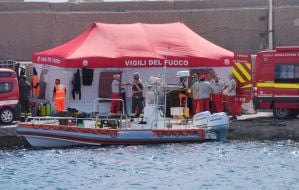
More inspections of sunken yacht carried out as hunt goes on for six feared dead

Police raid Andrew Tate’s home in Romania as new allegations emerge

Taylor Swift closes London shows alongside surprise guest Florence Welch

Luxury yacht disaster: what we know

Message submitting... Thank you for waiting.
Want us to email you top stories each lunch time?
NEWS... BUT NOT AS YOU KNOW IT
Putin rattled after Moscow hit by ‘largest ever drone attack’

Share this with
To view this video please enable JavaScript, and consider upgrading to a web browser that supports HTML5 video
Moscow came under one of the largest attacks yet by Ukrainian drones since the start of fighting in 2022, further rattling Vladimir Putin as he attempts to fight Ukrainian troops in the Kursk region.
The Ministry of Defence claimed that Russia downed 45 Ukrainian drones overnight, with 11 destroyed over the Moscow region, 23 over the Bryansk region, six over Belgorod, three over Kaluga and two over Kursk.
Moscow mayor Sergey Sobyanin said on his Telegram channel: ‘This was one of the biggest attempts of all time to attack Moscow using drones.’
He said strong defences around the capital made it possible to shoot down all the drones before they could hit their intended targets.
Some Russian social media channels shared videos of drones apparently being destroyed by air defence systems, which then set off car alarms.
Alexander Bogomaz, the governor of the Bryansk region, which borders Ukraine, reported a ‘mass’ attack on his region but that 23 drones were destroyed.

While Ukraine has been bogged down in a land conflict in eastern Europe in which the Russians have been driving forward slowly at a heavy cost to both sides, Kyiv has also been attacking Russia with drones.
Ukraine has targeted oil refineries and airfields in an attempt to weaken Russia’s fighting potential, and has also targeted the capital several times.
The drone attacks come as Ukrainian forces are continuing to push into Russia’s western Kursk region.
The daring incursion into Russia has raised morale in Ukraine with its surprising success and changed the dynamic of the fighting.

But it is uncertain how long Ukraine will be able to hold the territory it has seized in Kursk.
It has also opened up another front in a fight where Ukrainian forces were already badly stretched.
The gains in Kursk come as Ukraine continues to lose ground in its eastern industrial region of Donbas.
The Institute for the Study of War, a think tank based in Washington, said in its daily report late on Tuesday that the Ukrainians had made additional advances in their incursion, now in its third week.
The Russian state news agency Tass reported that 31 people had died since Ukraine’s attack on Russia began on August 6, citing an unnamed source in the medical service – figures which are impossible to verify.
Get in touch with our news team by emailing us at [email protected] .
For more stories like this, check our news page .
MORE : Ukraine tightens its grip on Kursk after blowing up third key bridge
MORE : George and Amal Clooney’s charity banned from Russia by Putin as he slams them as ‘warriors for justice’
MORE : Putin reignites body double rumours with photo of his ‘fabulous cheekbones’
Sign Up for News Updates
Get your need-to-know latest news, feel-good stories, analysis and more.
Privacy Policy

Get us in your feed
India's Modi to visit Ukraine on Aug. 23, weeks after rebuking Putin
- Medium Text
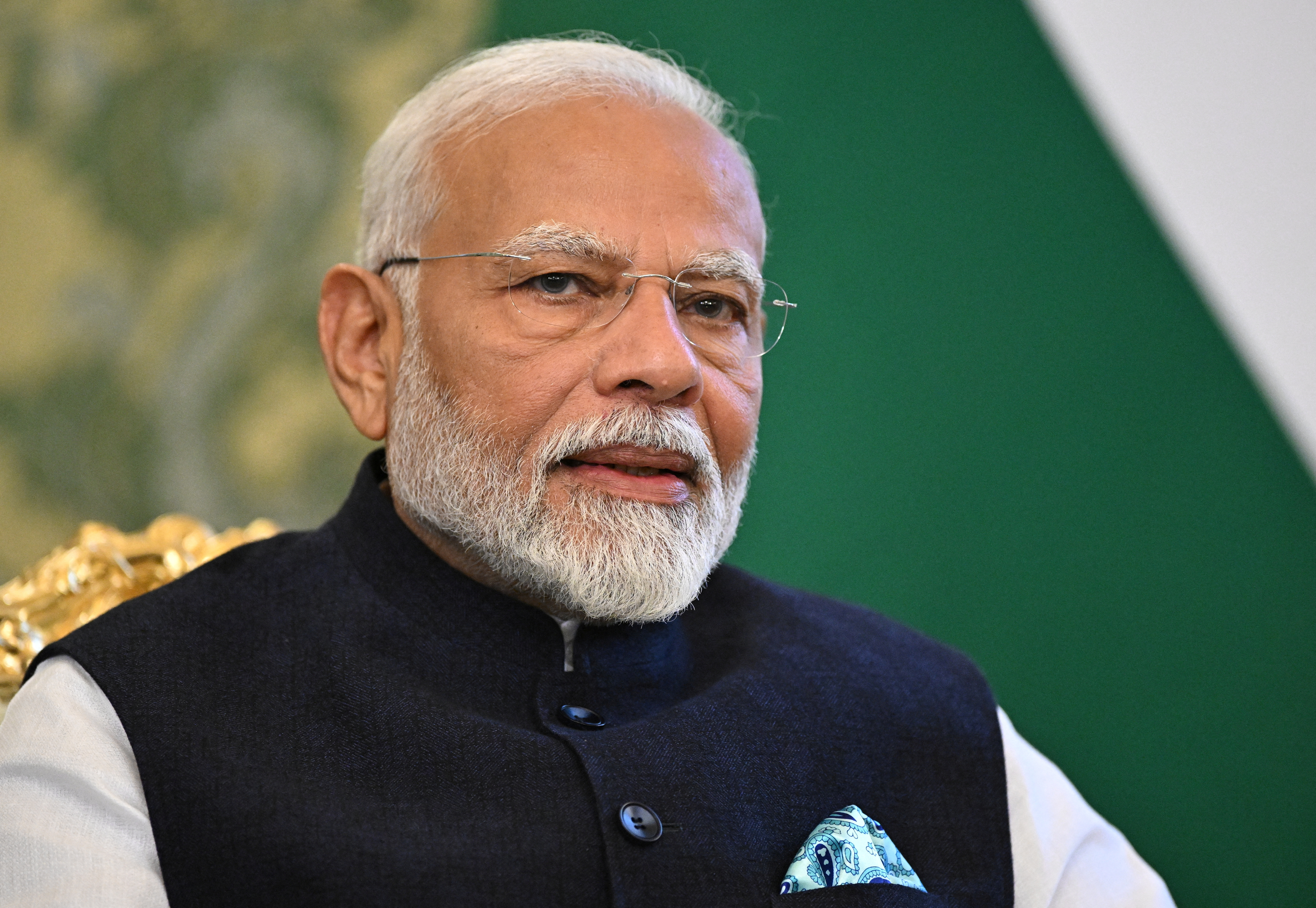
- Modi’s trip will be first by Indian PM in 3 decades
- Kyiv visit comes weeks after talks with Putin in Moscow
- Modi visit to Ukraine is not balancing act, New Delhi says
- India ready to help end Ukraine war, New Delhi reiterates
MODI REBUKED PUTIN IN MOSCOW
Sign up here.
Reporting by YP Rajesh; Additional reporting by Shivam Patel and Tanvi Mehta in New Delhi and Yuliia Dysa in Gdansk; editing by Giles Elgood and Timothy Heritage
Our Standards: The Thomson Reuters Trust Principles. , opens new tab

Lebanon's Hezbollah says it launched a drone attack on military posts in northern Israel
Lebanon's Hezbollah launched an attack with a swarm of drones on military posts in the kibbutz of Amiad in northern Israel, the armed group said in a statement on Wednesday.
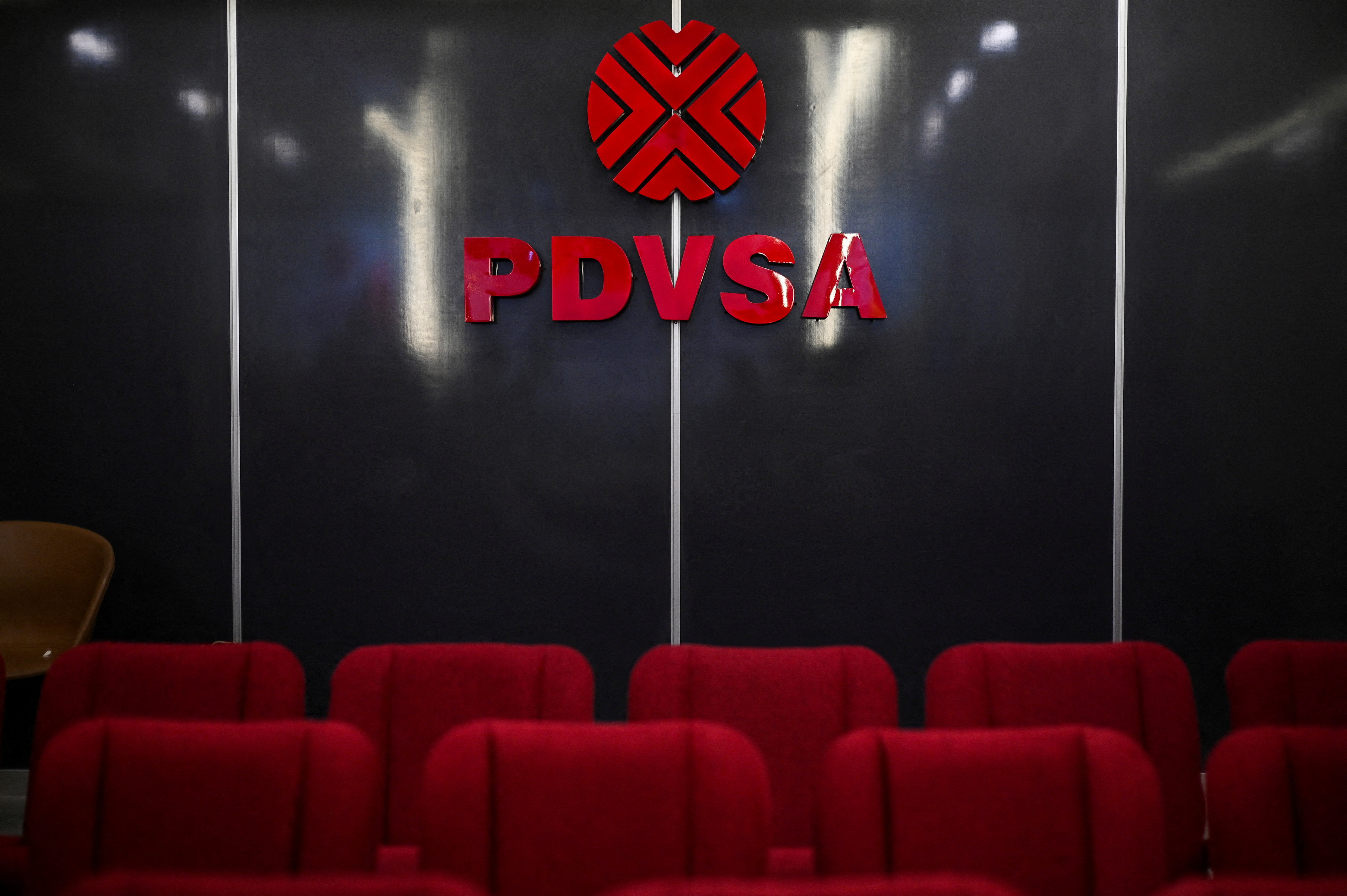

IMAGES
COMMENTS
The yacht Dragonfly, boasting a fascinating journey, was crafted to perfection by the acclaimed Silver Yachts, previously known as Silver Zwei.This awe-inspiring yacht was initially constructed as a speculation project, marking a bold venture in the luxury yacht industry. Delivered in 2009, this marvel of marine engineering caught the eye of Sergey Brin in 2011, who made it his own.
The Google founder Sergey Brin has spent the past few years building up his "Fly Fleet," including the 40-meter Butterfly. ... California, Brin maintains a growing flotilla of yachts, jet skis ...
Brin is the owner of the yacht Dragonfly.. The Dragonfly yacht, originally known as Silver Zwei, was constructed by Silver Yachts and later purchased by Sergey Brin. The yacht is a luxury haven for 14 guests and a crew of 16, showcasing the exceptional design work of Espen Oeino. The yacht demonstrates remarkable speed capabilities with a top speed of 27 knots and a cruising speed of 18 knots ...
Brin maintains a growing flotilla of yachts, jet skis and skiffs Sergey Brin's Dragonfly was once described as the "most fuel-efficient long-range cruising superyacht on the water". Photo ...
#6 Sergey Brin. Sergey Brin is the owner of the yacht Dragonfly. Brin is cofounder of Google and the 20 th richest person in the world. Sergey Brin is acting as Director of Special Projects at Google. (Update: we were told he actually sold his yacht) Net worth: US$ 86 billion
Brin has quietly collected a fleet of luxury yachts and water-sports vehicles that those in his inner circle call the "Fly Fleet," a recent Insider investigation into the post-Google lives of the ...
Discover the impressive yacht of co-founder of Google, Sergey Brin, in our newest YouTube Shorts video. We're taking you on a virtual tour around this sea ma...
Jul 28, 2023. Sergey Brin, the co-founder of Google, is known for his love of luxury yachts and watersports vehicles. He is passionate about spending time on the water with friends and family and has made that passion a reality through his Fly Fleet. The fleet consists of three main vessels - Dragonfly, Butterfly, and Firefly.
The superyacht reportedly owned by Google co-founder Sergey Brin is now for sale. Dragonfly is a reference to Google's once-secret project to launch a censored search engine in China. ... The 73.3-metre SilverYachts motor yacht Dragonfly is newly listed for sale with Ben Ritchie of Y.CO. Delivered in 2009 to a design by Espen Øino, Dragonfly ...
Google cofounder Sergey Brin has built a flotilla of yachts, boats, and toys known as the "Fly Fleet." Named after a once-secret Google product , the largest of Brin's armada is the sleek ...
It might end up being an airborne addition to Brin's collection of luxury yachts and water-sports vehicles that those in his inner circle have dubbed "Fly Feet." Sergey Brin, who has a net worth ...
The 256-foot yacht is named Venus, and is worth $130 million. AP Photo/Peter Dejong Source: Business Insider. Google's billionaire cofounders, Larry Page and Sergey Brin, are known to splurge. An ...
Google cofounder Sergey Brin's airship company, LTA Research, announced it received clearance to begin outdoor flights for its massive Pathfinder 1.
Managing the life of Sergey Brin is big business. Through Bayshore Global Management, the Google Inc. co- founder has hired former bankers and philanthropy experts to help manage his $30.1 billion ...
Jeff Bezos. The 127-metre Oceanco sailing yacht Koru, formerly Y721, was launched and reportedly delivered to Amazon founder Jeff Bezos in April 2023. This three-masted schooner, meaning "new beginnings" in Maori, with an expected 33000 GT and a steel hull and aluminium superstructure, is the largest in the world and the longest built in ...
Brin met Larry Page at Stanford in 1995. The two became close friends, geeking out about computer science. They started collaborating on a search engine they initially called BackRub. They ...
An Inside Look at the Life of Google Co-founder, Sergey Brin. ਸਰਗੇਈ ਬ੍ਰਿਨ, a prominent name in the world of technology, is widely recognized as the co-founder of Google, the leading search engine that has revolutionized information accessibility on the global stage.Born in ਮਾਸਕੋ in August 1973, Brin relocated to the United States in 1979 at the tender age of six.
If you're Sergey Brin, Evan Spiegel, Jan Koum, Jeff Bezos, Laurene Powell Jobs, Eric Schmidt, Yuri Milner or any one of dozens of other modern-day tech moguls, it's not enough to just own a yacht. Now you might need two—one for you and your guests to ride on, and one to act as a "support vessel," tailing you around the seven seas while towing submersibles, seaplanes, helicopters or ...
Google founders Larry Page and Sergey Brin are recognized for their efforts at the conclusion of the Clinton Global Initiative in New York, September 22, 2006. Former US President Bill Clinton's ...
Sergey Mikhailovich Brin (Russian: Сергей Михайлович Брин; born August 21, 1973) is an American businessman and computer scientist who co-founded Google with Larry Page.He was the president of Google's parent company, Alphabet Inc., until stepping down from the role on December 3, 2019. [1] He and Page remain at Alphabet as co-founders, controlling shareholders, and board ...
Voted best interior at the International Superyacht Society Awards 2008 and best sailing yacht over 45 metres at the 2009 World Superyacht Awards The Bayesian was a 56-metre (184 ft) sailing superyacht built by Perini Navi in Italy and delivered in 2008 under the original name Salute . [ 1 ]
"This was one of the biggest attempts of all time to attack Moscow using drones," Moscow mayor Sergey Sobyanin said on his Telegram channel. He said strong defences around the capital made it ...
The Air Defense Forces of the Ministry of Defense shot down 10 UAVs Tuesday night and two more Wednesday morning, local time, according to Moscow Mayor Sergey Sobyanin. It was not clear how many ...
The Story of Sergey Brin - It takes a bit of searching to find Sergey Brin's office at the Googleplex. Tucked away in a corner of Building #43 on this sprawling campus near the southern tip of San Francisco Bay, past rows of colorfully decorated cubicles and dorm-like meeting spaces, Office 211 has a nondescript exterior and sits far from the public eye.
Moscow's mayor Sergey Sobyanin said 10 UAVs had been destroyed over the Moscow region. ... Bayesian yacht captain breaks silence with four-word statement after ship sinks in Sicily.
Sergey Brin, co-founder of Google and Alphabet Inc., is the illustrious owner of the yacht, although sources hint at the possibility that he may have sold it. नौका Dragonfly is a luxurious investment worth approximately $80 million, with estimated annual running costs of around $8 million.
Russian authorities have said Moscow came under the largest attack yet by Ukrainian drones since the start of fighting in 2022, and that it destroyed all of them.
Moscow mayor Sergey Sobyanin said on his Telegram channel: 'This was one of the biggest attempts of all time to attack Moscow using drones.' ... Last moments of Bayesian yacht as it's battered ...
India's Prime Minister Narendra Modi attends a meeting with Russia's President Vladimir Putin at the Kremlin in Moscow, Russia July 9, 2024. Sputnik/Sergey Bobylev/Kremlin via REUTERS/File Photo ...
This awe-inspiring yacht was initially constructed as a speculation project, marking a bold venture in the luxury yacht industry. Delivered in 2009, this marvel of marine engineering caught the eye of Sergey Brin in 2011, who made it his own. ਕੁੰਜੀ ਟੇਕਅਵੇਜ਼